~e . MESSENGER J "
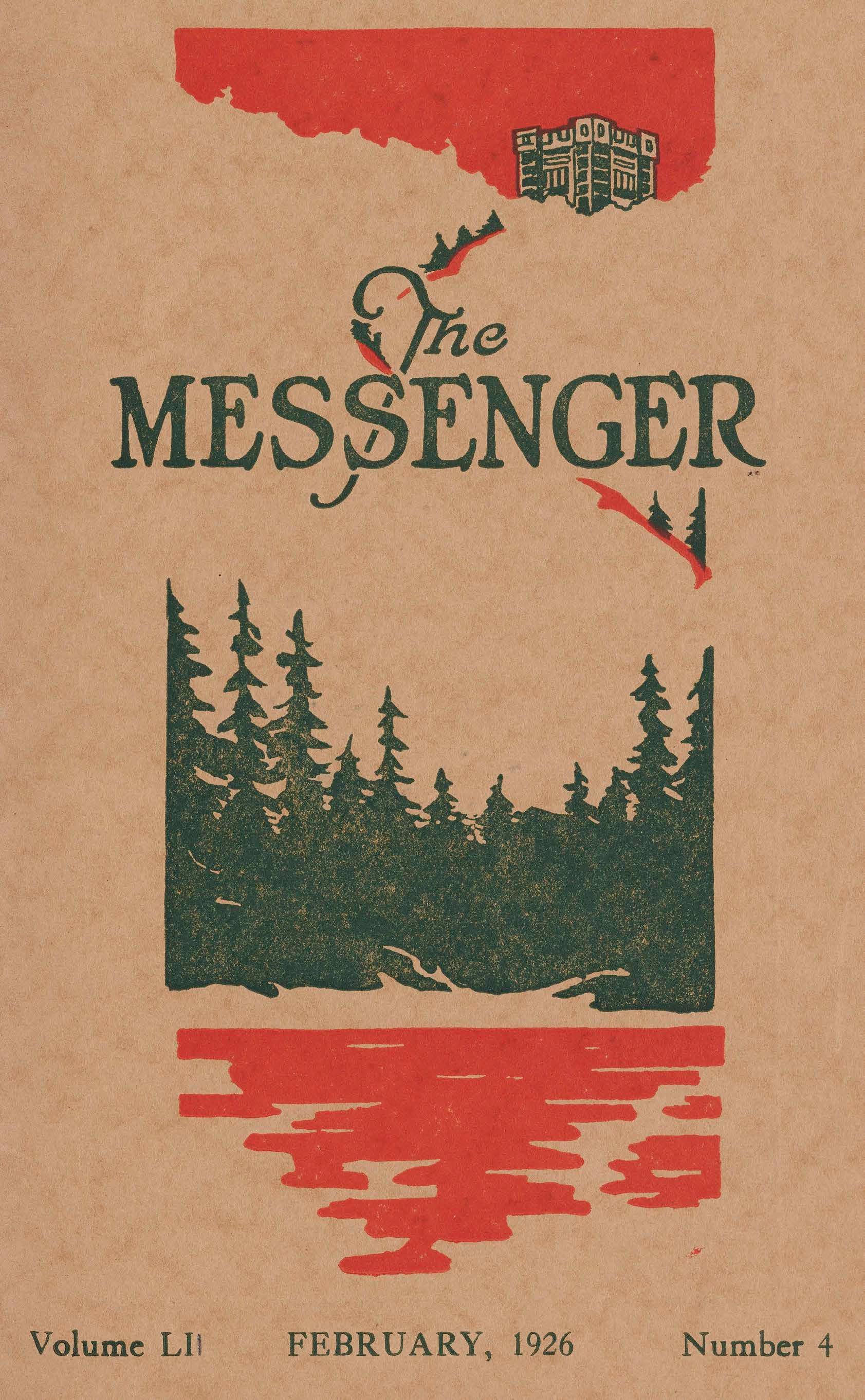
University of Richmond Students Cordially Invited to


University of Richmond Students Cordially Invited to
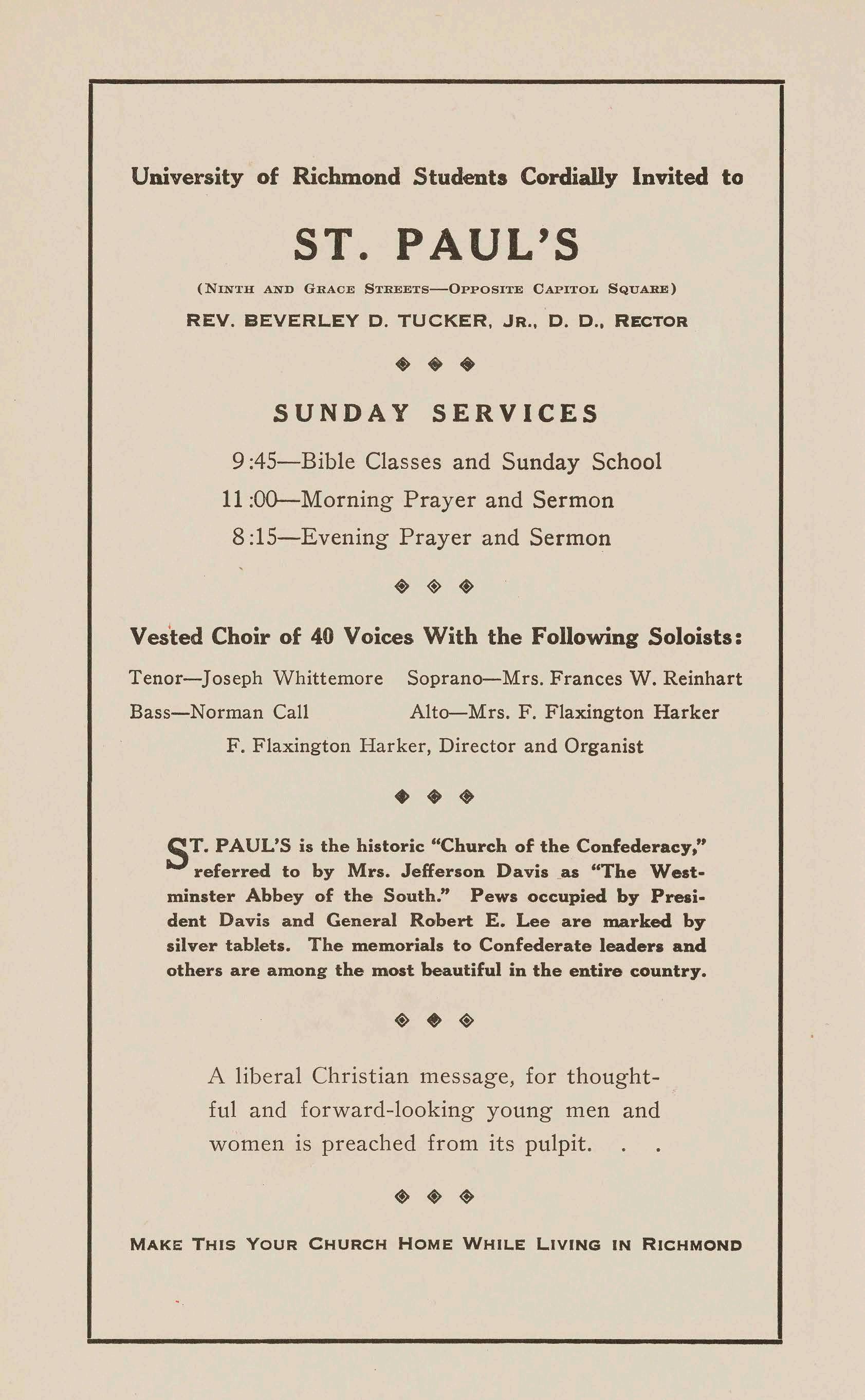
(NINTH AND
REV. BEVERLEY D. TUCKER, JR., D. D., RECTOR
SUNDAY SERVICES
9 :45-Bible Classes and Sunday School
11 :00---Morning Prayer and Sermon
8 :15-Evening Prayer and Sermon
Ves'ted Choir of 40 Voices With the Following Soloists: Tenor-Joseph Whittemore Soprano-Mrs. Frances W. Reinhart Bass-Norman Call Alto-Mrs. F. Flaxington Harker F. Flaxington Harker, Director and Organist
ST.PAUL'S is the historic "Church of the Confederacy." referred to by Mrs. Jefferson Davis as "The West• minster Abbey of the South." Pews occupied by President Davis and General Robert E. Lee are marked by silver tablets. The memorials to Confederate leaders and others are among the most beautiful in the entire country.
A liberal Christian message, for thoughtful and forward-looking young men and women is preached from its pulpit
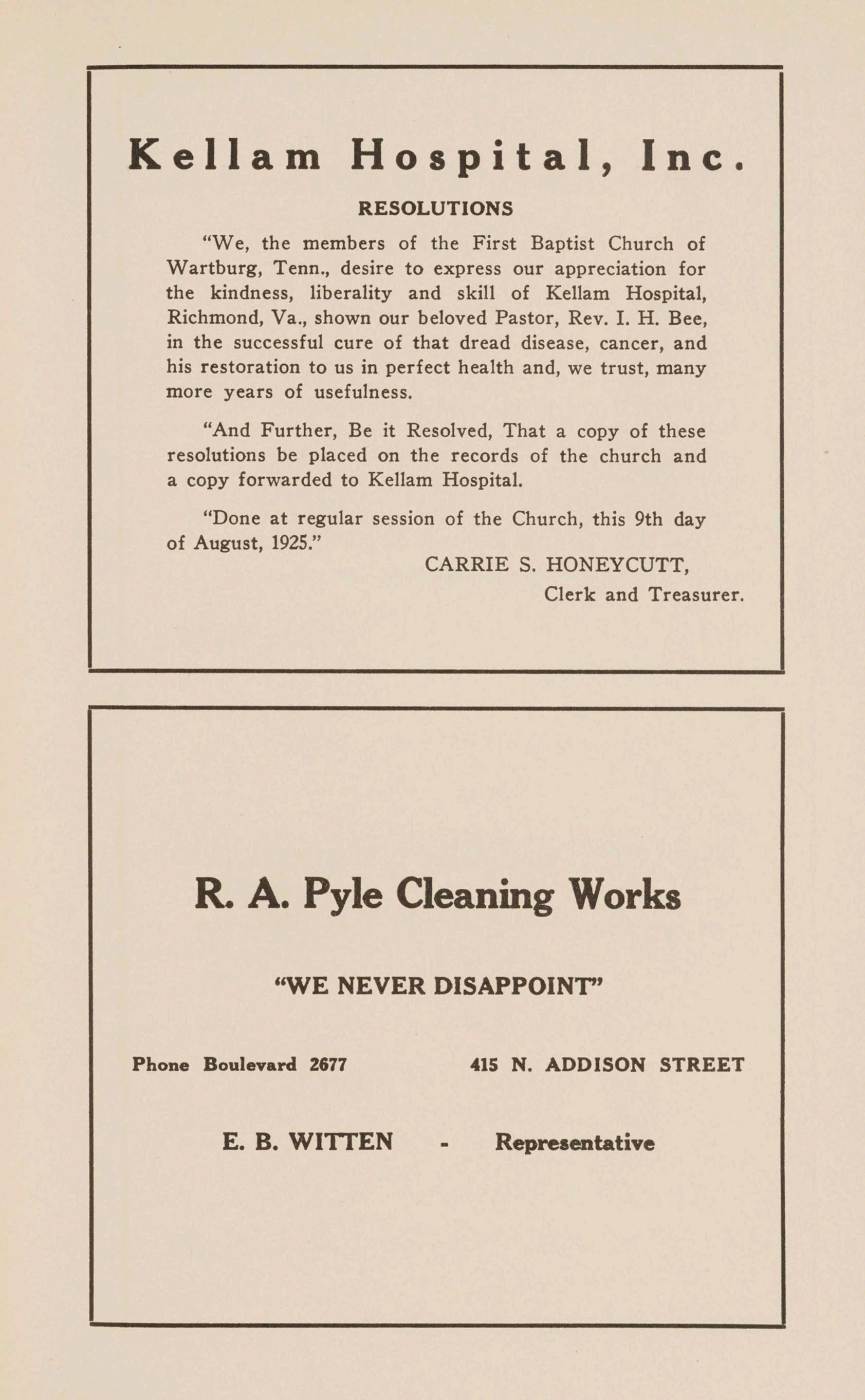
"We, the members of the First Baptist Church of Wartburg, Tenn., desire to express our appreciation for the kindness, liberality and skill of Kellam Hospital, Richmond, Va., shown our beloved Pastor, Rev. I. H. Bee, in the successful cure of that dread disease, cancer, and his restoration to us in perfect health and, we trust, many more years of usefulness.
"And Further, Be it Resolved, That a copy of these resolutions be placed on the records of the church and a copy forwarded to Kellam Hospital.
"Done at regular session of the Church, this 9th day of August, 1925.''
CARRIE S. HONEYCUTT, Clerk and Treasurer.

YOUR SEMINARY
Entirely new suburban home by January, 1926; progressive and orthodox faculty of eminent Christian scholars; comprehensive and practical curriculum; large and world-wide student fellowship; numerous student-served churches; tutition free; financial assistance where needed, and moderate expenses; the Harvard or Johns Hopkins of the theological world.
Twenty-two University of Richmond students last Session. University of Richmond third among 167 schools. University of Richmond men have high rating.
Write E. Y. MULLINS, President
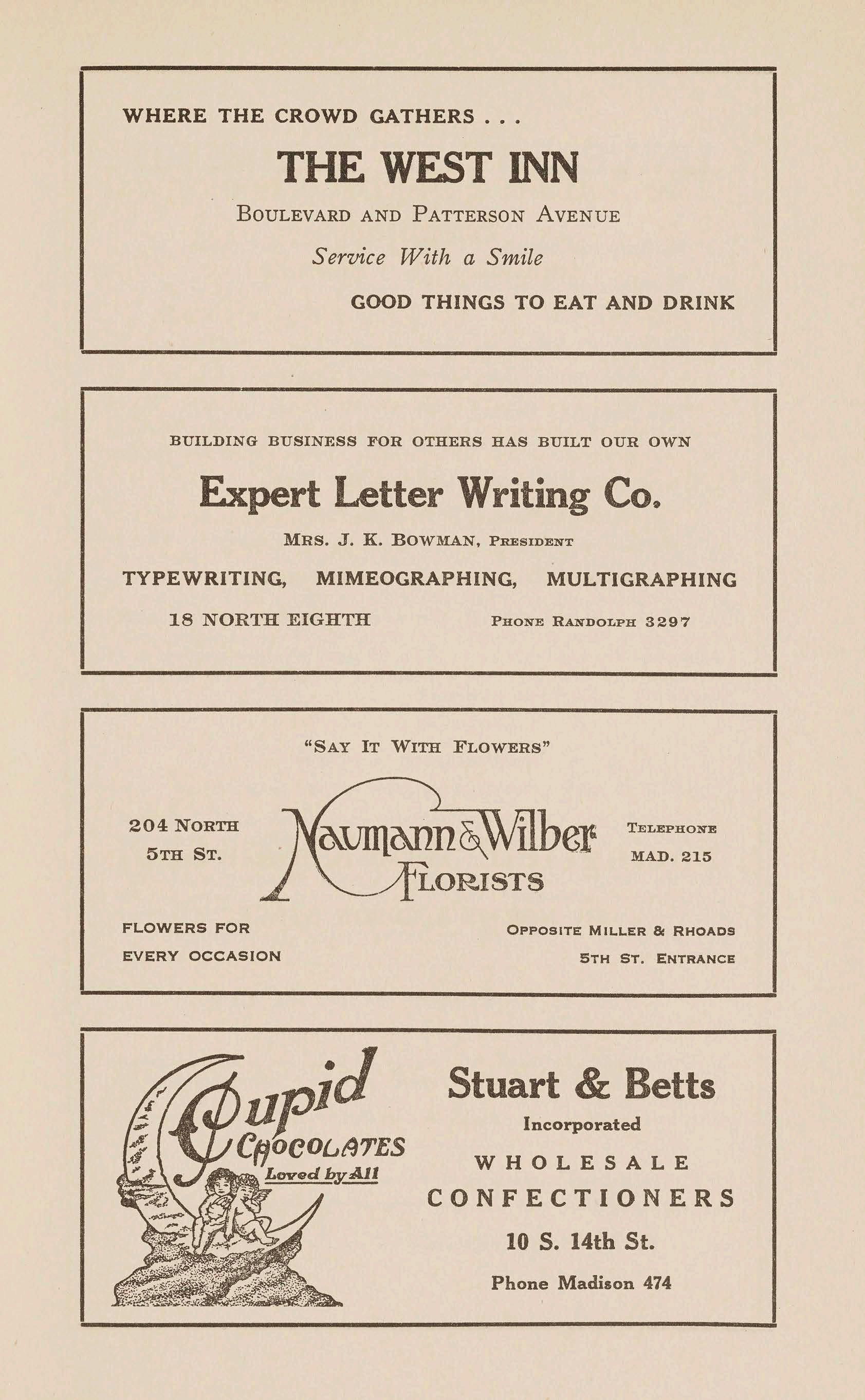
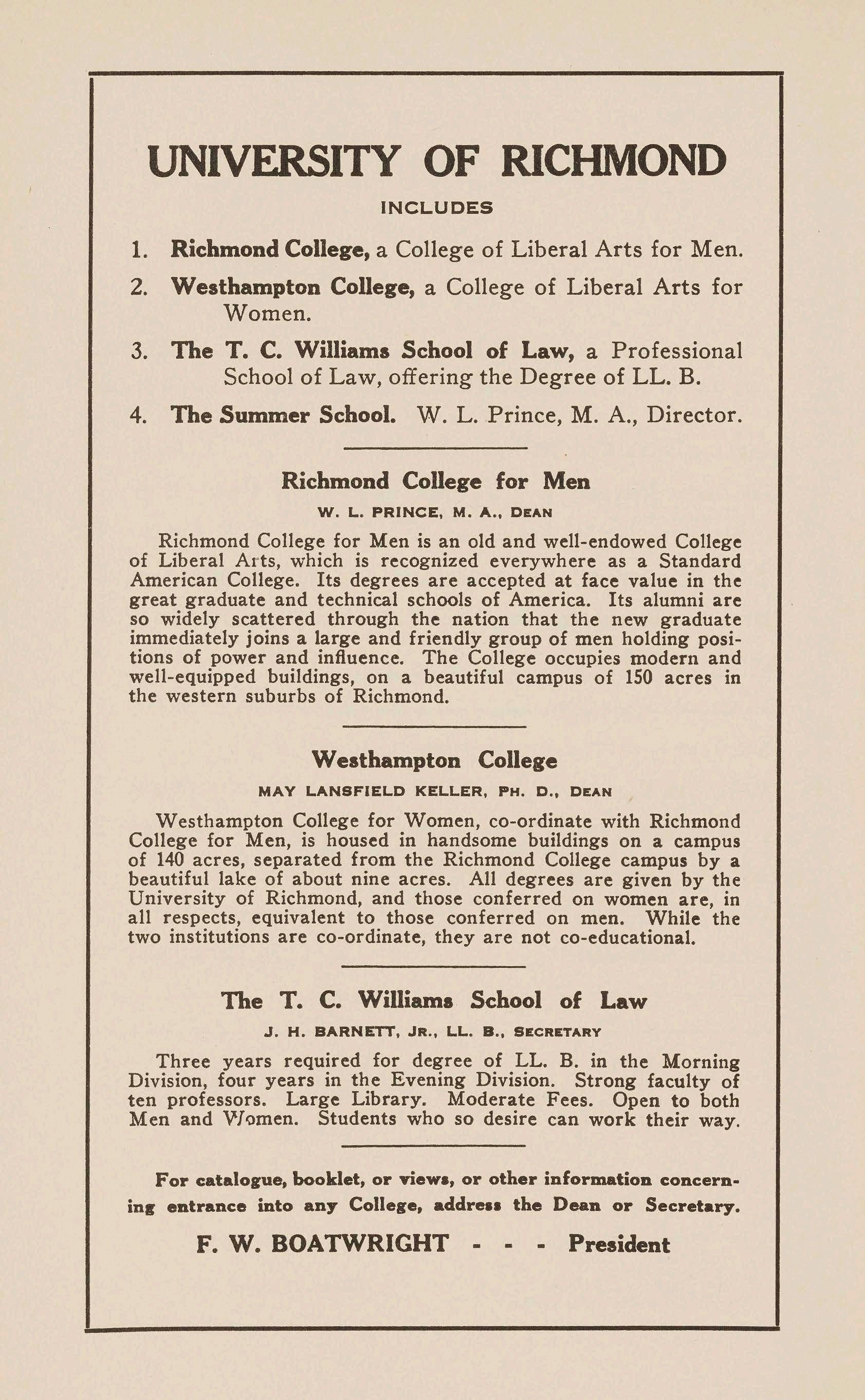
1. Richmond College, a College of Liberal Arts for Men.
2. Westhampton College, a College of Liberal Arts for Women.
3. The T. C. Williama School of Law, a Professional School of Law, offering the Degree of LL. B.
4. The Summer School. W. L. Prince, M.A., Director.
W. L. PRINCE, M. A., DEAN
Richmond College for Men is an old and well-endowed College of Liberal Arts, which is recognized everywhere as a Standard American College. Its degrees are accepted at face value in the great graduate and technical schools of America. Its alumni are so widely scattered through the nation that the new graduate immediately joins a large and friendly group of men holding positions of power and influence. The College occupies modern and well-equipped buildings, on a beautiful campus of 150 acres in the western suburbs of Richmond.
MAY LANSFIELD KELLER, PH. D., DEAN
Westhampton College for Women, co-ordinate with Richmond College for Men, is housed in handsome buildings on a campus of 140 acres, separated from the Richmond College campus by a beautiful lake of about nine acres. All degrees are given by the University of Richmond, and those conferred on women are, in all respects, equivalent to those conferred on men. While the two institutions are co-ordinate, they are not co-educational.
.J. H, BARNETT, .JR., LL. 8., SECRETARY
Three years required for degree of LL. B. in the Morning Division, four years in the Evening Division. Strong faculty of ten professors. Large Library. Moderate Fees. Open to both Men and Vfomcn. Students who so desire can work their way.
For catalogue, booklet, or Tiewa, or other information concerning entrance into an:, College, addreu the Dean or Secretary.
F. W. BOATWRIGHT - President
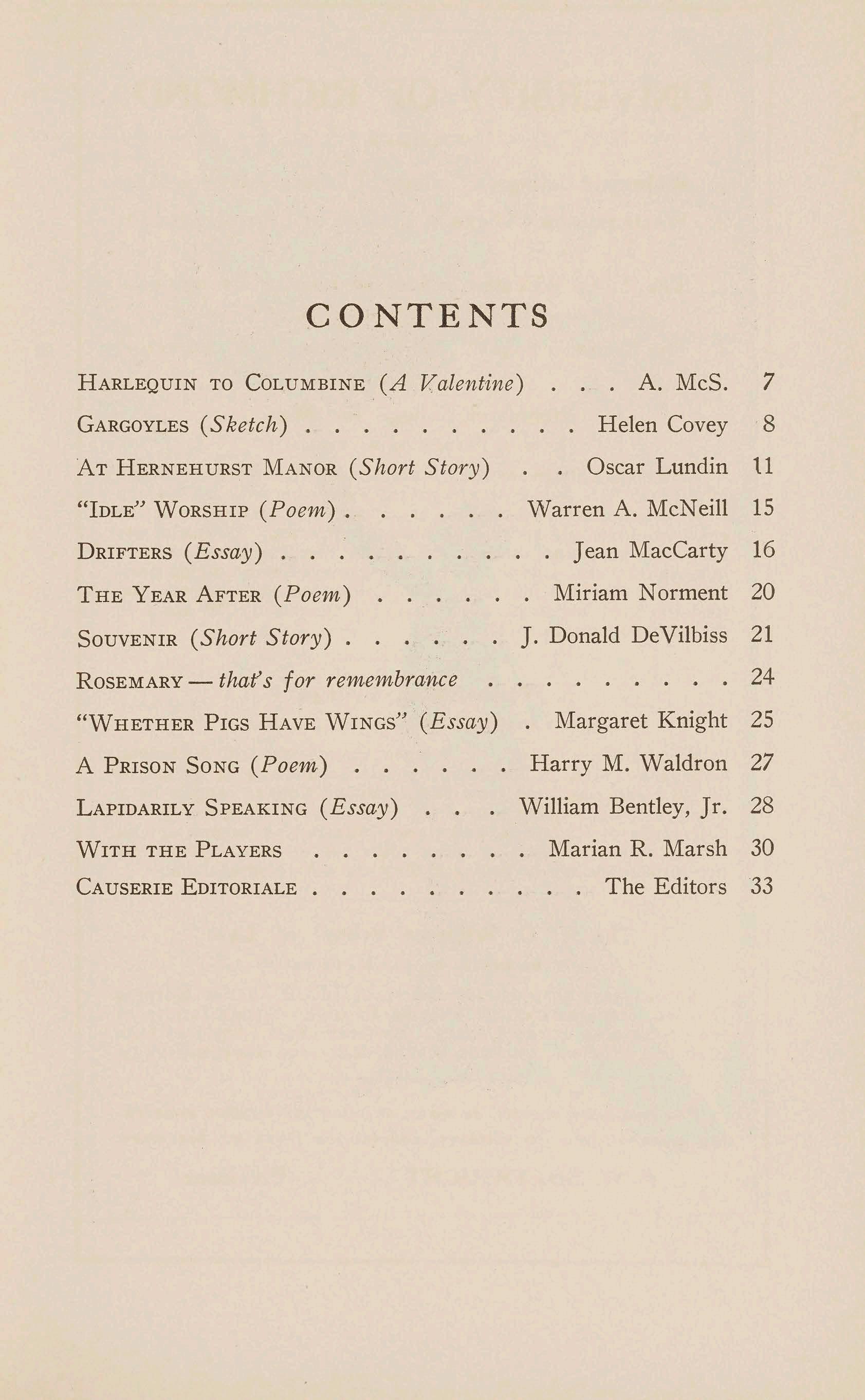
HARLEQUINTO COLUMBINE(A Valentine)
GARGOYLES(Sketch) . . . .
AT HERNEHURSTMANOR (Short Story)
"IDLE" WORSHIP (Poem).
DRIFTERS(Essay) . . . THE YEAR AFTER (Poem) . A. McS . Helen Covey
Oscar Lundin
Warren A. McNeill
Jean MacCarty
Miriam Norment
SouvENIR (Short Story) J. Donald De Vilbiss
RosEMARY - that's for remembrance . . .
"WHETHER PIGS HAVE WINGS" (Essay) Margaret Knight
A PRISONSONG (Poem) Harry M. Waldron
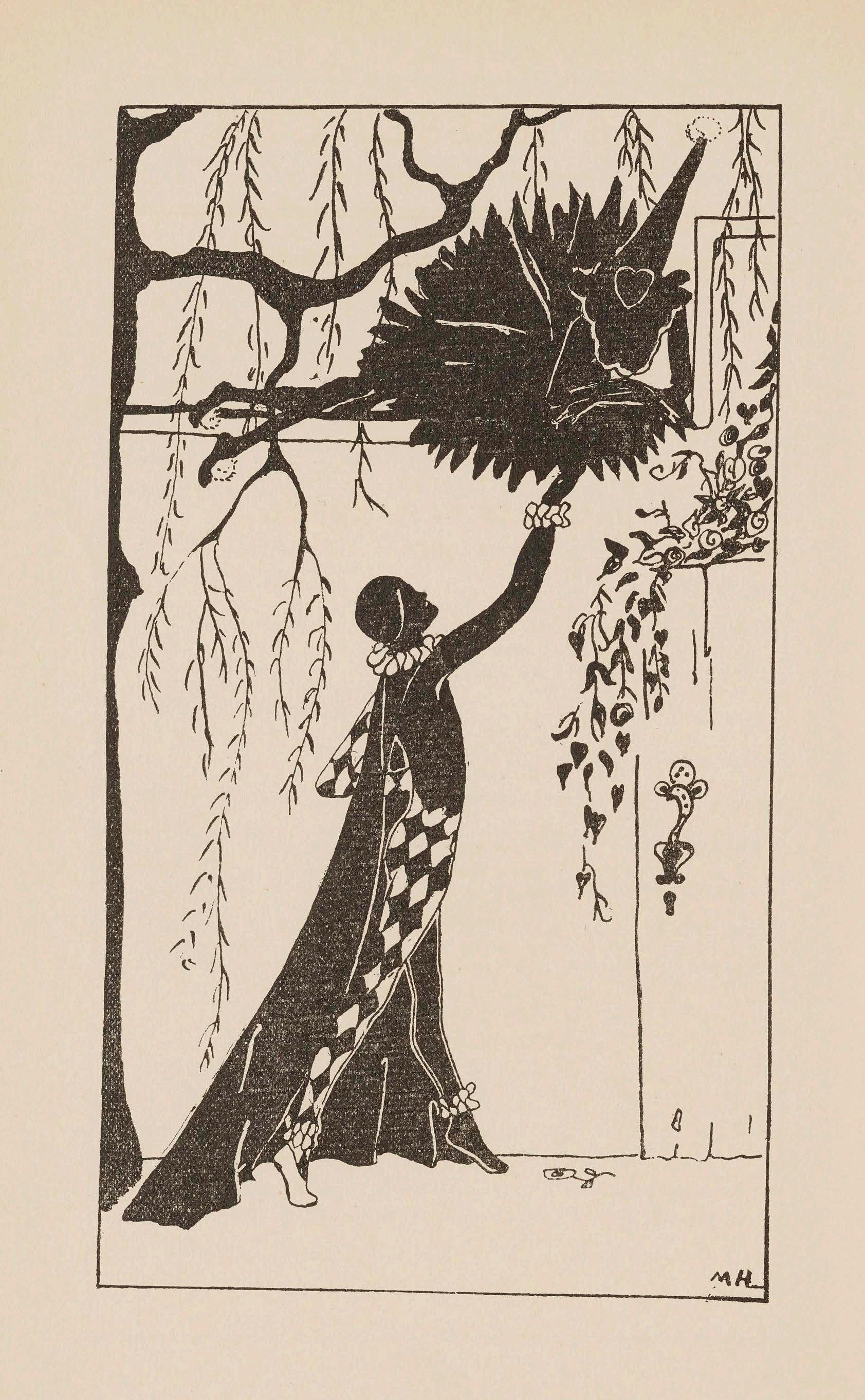
COPYRIGHT 19Z6 BY LESLm L. JONES
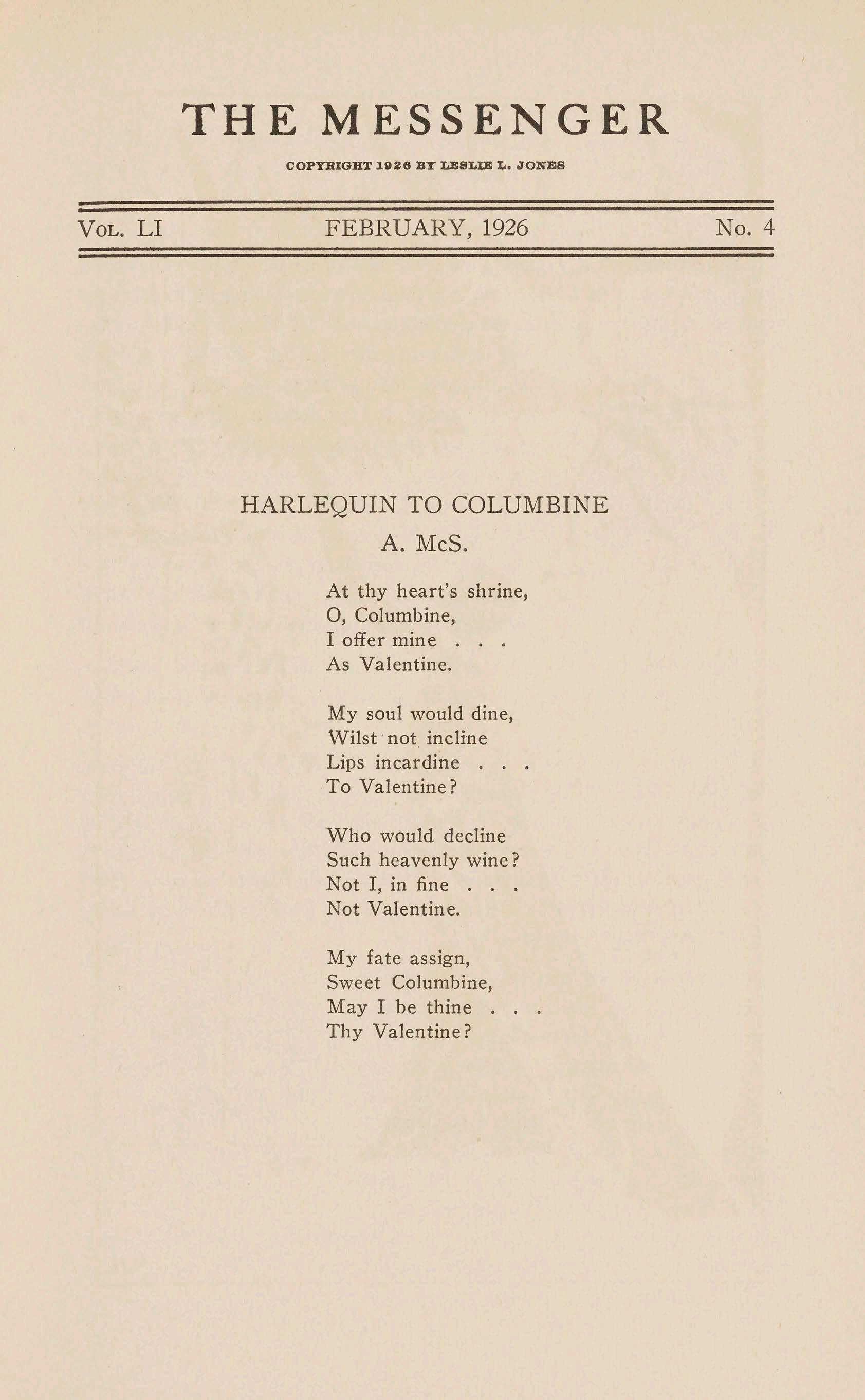
No. 4
At thy heart's shrine, 0, Columbine, I offer mine . As Valentine.
My soul would dine, Wilst ·not incline Lips incardine To Valentine?
Who would decline Such heavenly wine? Not I, in fine . Not Valentine.
My fate assign, Sweet Columbine, May I be thine Thy Valentine?
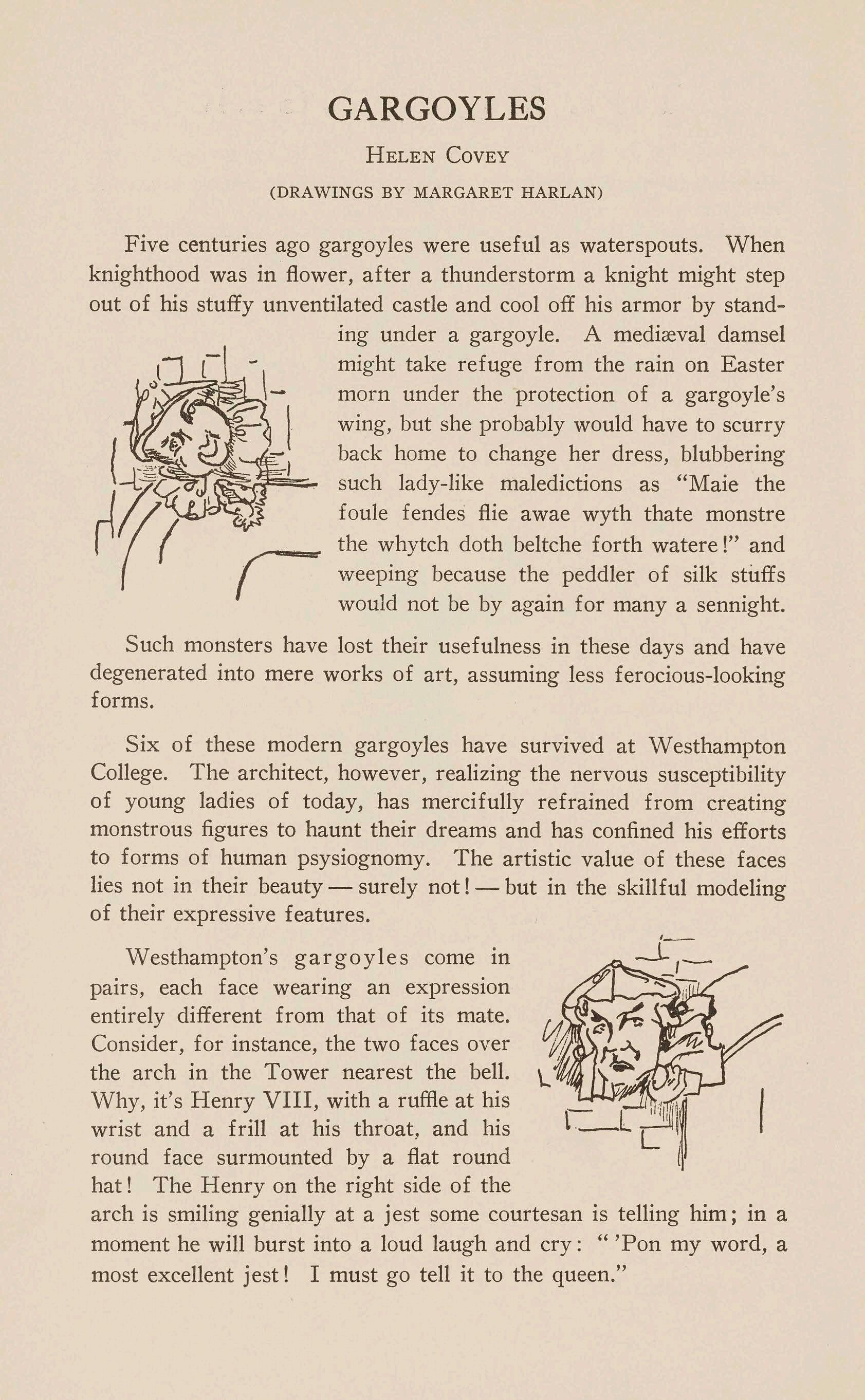
HELEN COVEY
(DRAWINGS BY MARGARET HARLAN)
Five centuries ago gargoyles were useful as waterspouts. When knighthood was in flower, after a thunderstorm a knight might step out of his stuffy unventilated castle and cool off his armor by standing under a gargoyle. A medfreval damsel might take refuge from the rain on Easter morn under the protection of a gargoyle's wing, but she probably would have to scurry back home to change her dress, blubbering such lady-like maledictions as "Maie the foule fend es flie awae wyth thate monstre the whytch doth beltche forth watere !" and weeping because the peddler of silk stuffs would not be by again for many a sennight. Such monsters have lost their usefulness in these days and have degenerated into mere works of art, assuming less ferocious-looking forms.
Six of these modern gargoyles have survived at Westhampton College. The architect, however, realizing the nervous susceptibility of young ladies of today, has mercifully refrained from creating monstrous figures to haunt their dreams and has confined his efforts to forms of human psysiognomy. The artistic value of these faces lies not in their beauty-surely not! -but in the skillful modeling of their expressive features.
Westhampton's gargoyles come in pairs, each face wearing an expression entirely different from that of its mate. Consider, for instance, the two faces over the arch in the Tower nearest the bell. Why, it's Henry VIII, with a ruffle at his wrist and a frill at his throat, and his round face surmounted by a flat round hat ! The Henry on the right side of the arch is smiling genially at a jest some courtesan is telling him; in a moment he will burst into a loud laugh and cry: " 'Pon my word, a most excellent jest! I must go tell it to the queen."
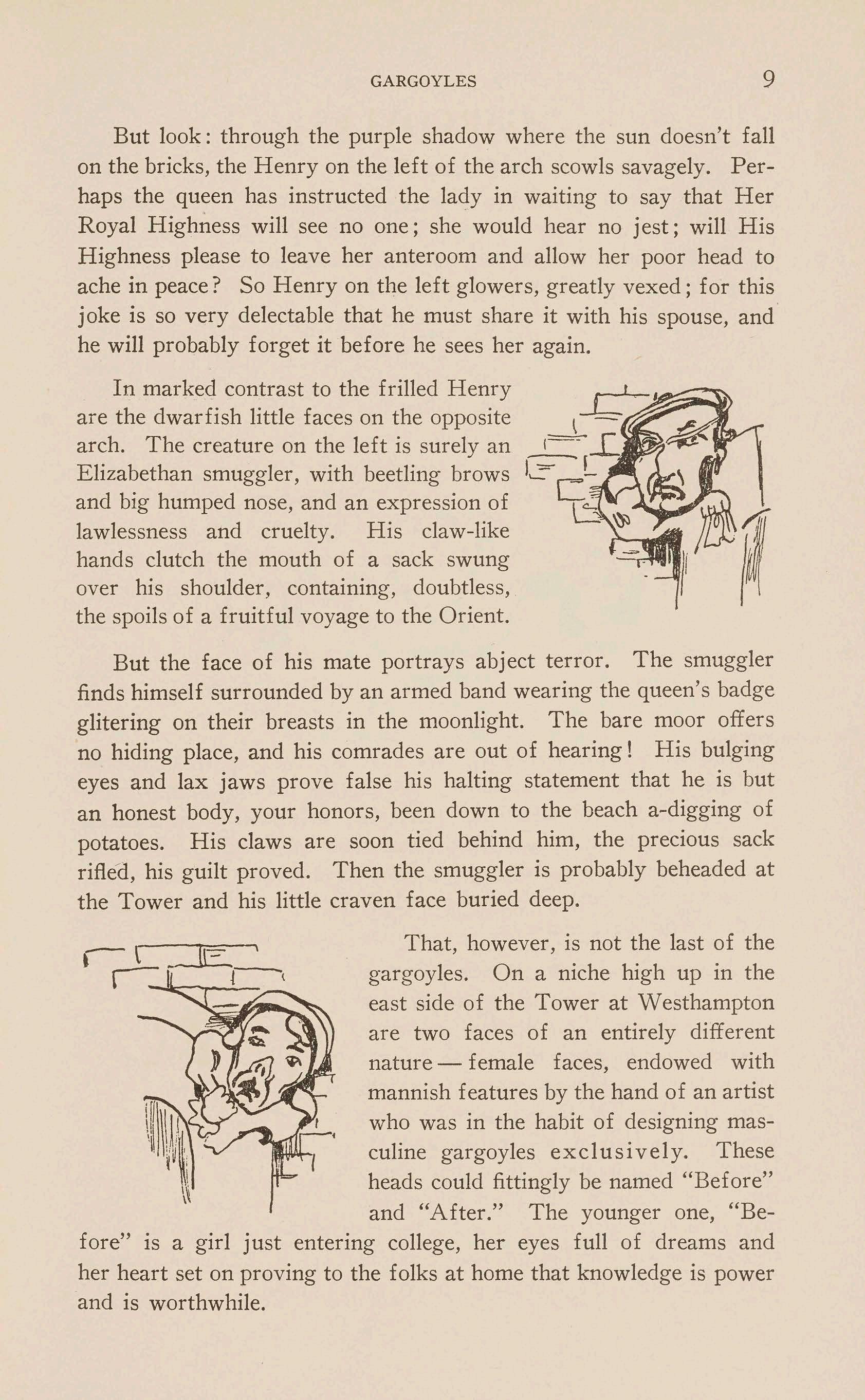
But look: through the purple shadow where the sun doesn't fall on the bricks, the Henry on the left of the arch scowls savagely. Perhaps the queen has instructed the lady in waiting to say that Her Royal Highness will see no one; she would hear no jest; will His Highness please to leave her anteroom and allow her poor head to ache in peace? So Henry on the left glowers, greatly vexed; for this joke is so very delectable that he must share it with his spouse, and he will probably forget it before he sees her again.
In marked contrast to the frilled Henry are the dwarfish little faces on the opposite arch. The creature on the left is surely an Elizabethan smuggler, with beetling brows and big humped nose, and an expression of lawlessness and cruelty. His claw-like hands clutch the mouth of a sack swung over his shoulder, containing, doubtless, the spoils of a fruitful voyage to the Orient.
But the face of his mate portrays abject terror. The smuggler finds himself surrounded by an armed band wearing the queen's badge glitering on their breasts in the moonlight. The bare moor offers no hiding place, and his comrades are out of hearing ! His bulging eyes and lax jaws prove false his halting statement that he is but an honest body, your honors, been down to the beach a-digging of potatoes. His claws are soon tied behind him, the precious sack rifled, his guilt proved. Then the smuggler is probably beheaded at the Tower and his little craven face buried deep .
That, however, is not the last of the gargoyles. On a niche high up in the east side of the Tower at Westhampton are two faces of an entirely different nature -female faces, endowed with mannish features by the hand of an artist who was in the habit of designing masculine gargoyles exclusively . These heads could fittingly be named "Before" and "After." The younger one, "Before" is a girl just entering college, her eyes full of dreams and her heart set on proving to the folks at home that knowledge is power and is worthwhile.
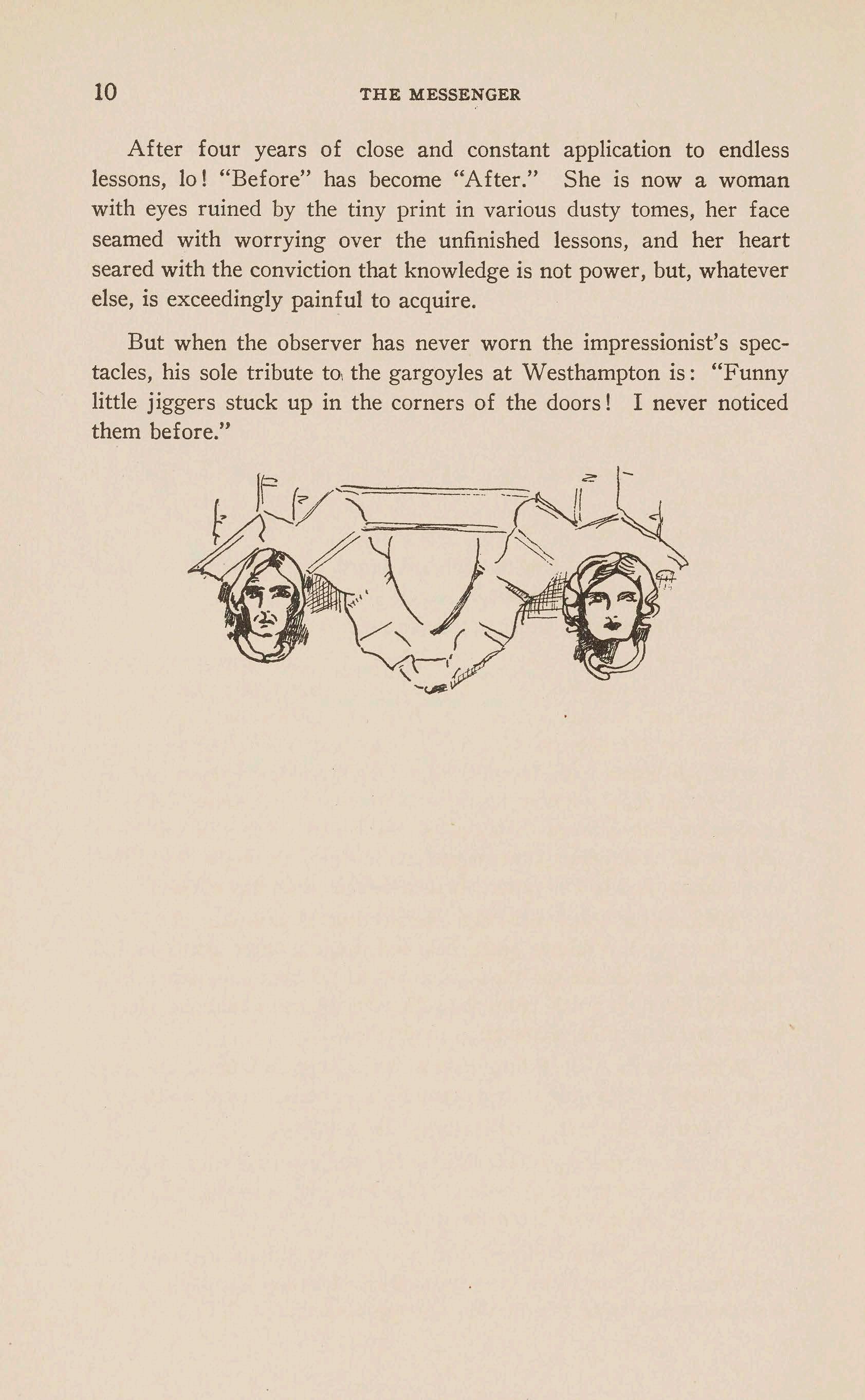
After four years of close and constant application to endless lessons, lo! "Before" has become "After." She is now a woman with eyes ruined by the tiny print in various dusty tomes, her face seamed with worrying over the unfinished lessons, and her heart seared with the conviction that knowledge is not power, but, whatever else, is exceedingly painful to acquire.
But when the observer has never worn the impressionist's spectacles, his sole tribute to, the gargoyles at Westhampton is : "Funny little jiggers stuck up in the corners of the doors! I never noticed them before."
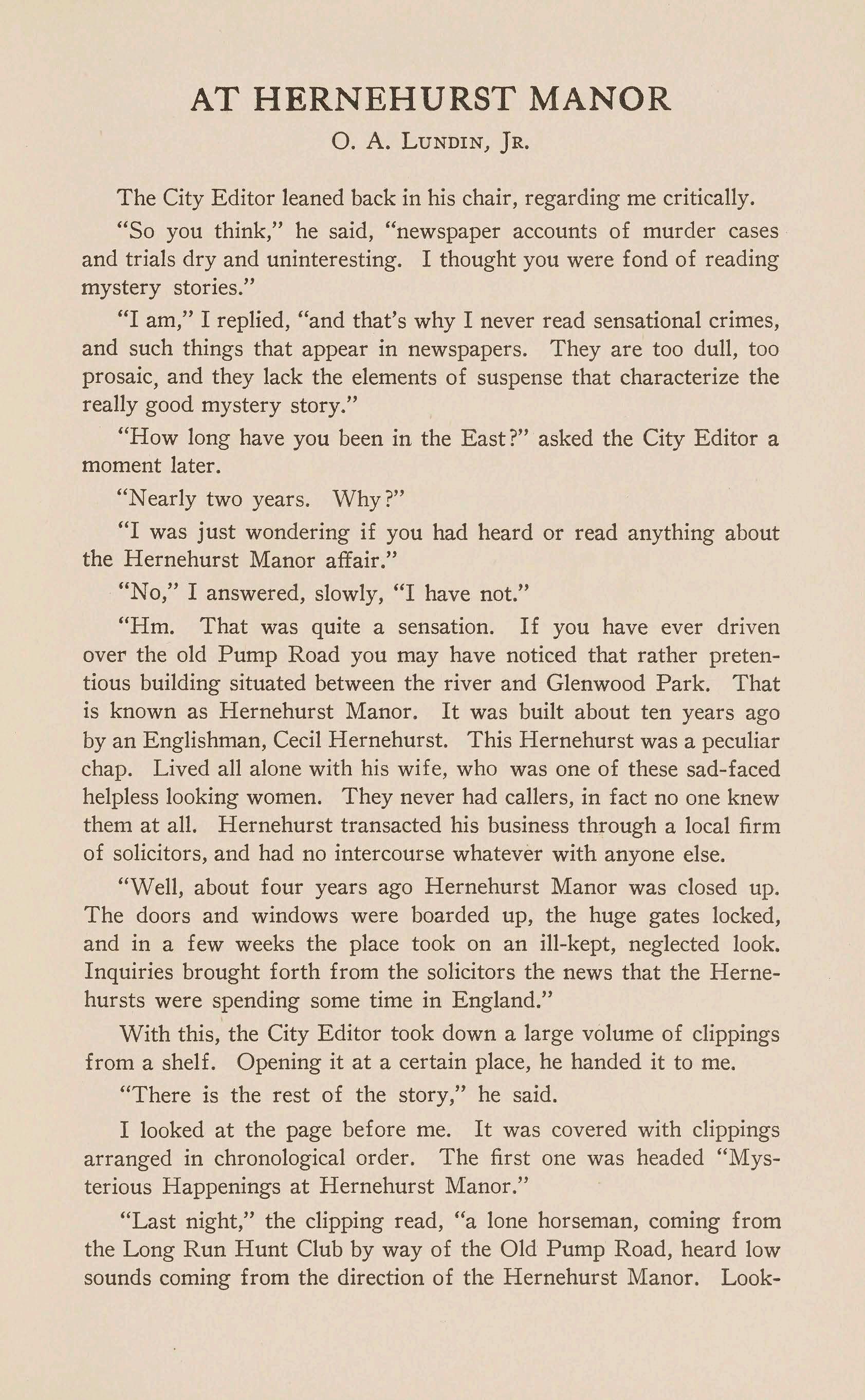
0. A. LUNDIN, JR.
The City Editor leaned back in his chair, regarding me critically.
"So you think," he said, "newspaper accounts of murder cases and trials dry and uninteresting. I thought you were fond of reading mystery stories."
"I am," I replied, "and that's why I never read sensational crimes, and such things that appear in newspapers. They are too dull, too prosaic, and they lack the elements of suspense that characterize the really good mystery story."
"How long have you been in the East?" asked the City Editor a moment later.
"Nearly two years. Why?"
"I was just wondering if you had heard or read anything about the Hernehurst Manor affair."
"No," I answered, slowly, "I have not."
"Hm. That was quite a sensation. If you have ever driven over the old Pump Road you may have noticed that rather pretentious building situated between the river and Glenwood Park. That is known as Hernehurst Manor. It was built about ten years ago by an Englishman, Cecil Hernehurst. This Hernehurst was a peculiar chap. Lived all alone with his wife, who was one of these sad-faced helpless looking women. They never had callers, in fact no one knew them at all. Hernehurst transacted his business through a local firm of solicitors, and had no intercourse whatever with anyone else.
"Well, about four years ago Hernehurst Manor was closed up. The doors and windows were boarded up, the huge gates locked, and in a few weeks the place took on an ill-kept, neglected look. Inquiries brought forth from the solicitors the news that the Hernehursts were spending some time in England."
With this, the City Editor took down a large volume of clippings from a shelf. Opening it at a certain place, he handed it to me.
"There is the rest of the story," he said.
I looked at the page before me. It was covered with clippings arranged in chronological order. The first one was headed "Mysterious Happenings at Hernehurst Manor."
"Last night," the clipping read, "a lone horseman, coming from the Long Run Hunt Club by way of the Old Pump Road, heard low sounds coming from the direction of the Hernehurst Manor. Look-
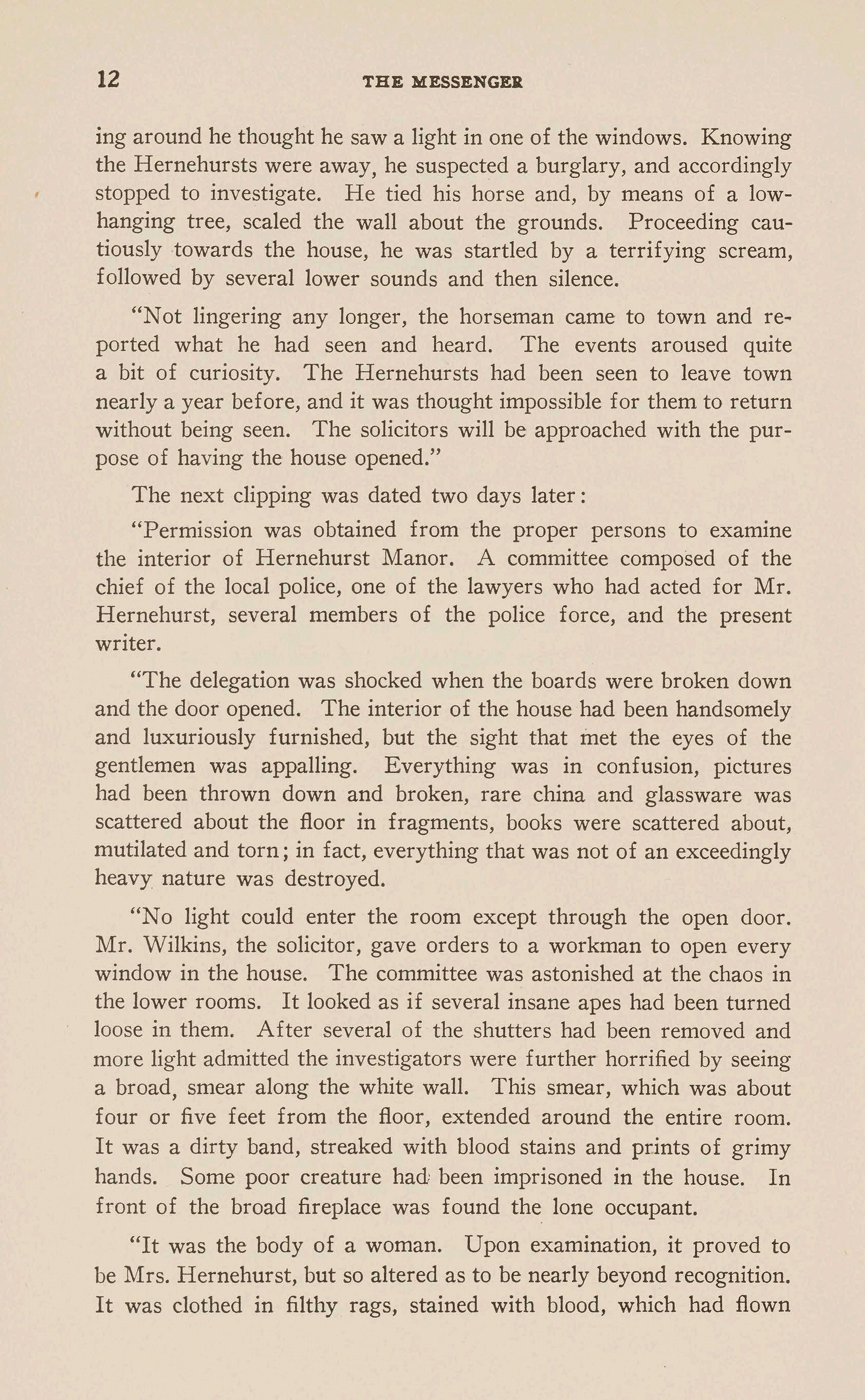
ing around he thought he saw a light in one of the windows. Knowing the Hernehursts were away, he suspected a burglary, and accordingly stopped to investigate. He tied his horse and, by means of a lowhanging tree, scaled the wall about the grounds. Proceeding cautiously towards the house, he was startled by a terrifying scream, followed by several lower sounds and then silence.
"Not lingering any longer, the horseman came to town and reported what he had seen and heard. The events aroused quite a bit of curiosity. The Hernehursts had been seen to leave town nearly a year before, and it was thought impossible for them to return without being seen. The solicitors will be approached with the purpose of having the house opened."
The next clipping was dated two days later:
"Permission was obtained from the proper persons to examine the interior of Hernehurst Manor. A committee composed of the chief of the local police, one of the lawyers who had acted for Mr. Hernehurst, several members of the police force, and the present writer.
"The delegation was shocked when the boards were broken down and the door opened. The interior of the house had been handsomely and luxuriously furnished, but the sight that met the eyes of the gentlemen was appalling. Everything was in confusion, pictures had been thrown down and broken, rare china and glassware was scattered about the floor in fragments, books were scattered about, mutilated and torn; in fact, everything that was not of an exceedingly heavy nature was destroyed.
"No light could enter the room except through the open door. Mr. Wilkins, the solicitor, gave orders to a workman to open every window in the house. The committee was astonished at the chaos in the lower rooms. It looked as if several insane apes had been turned loose in them. After several of the shutters had been removed and more light admitted the investigators were further horrified by seeing a broad, smear along the white wall. This smear, which was about four or five feet from the floor, extended around the entire room. It was a dirty band, streaked with blood stains and prints of grimy hands. Some poor creature had been imprisoned in the house. In front of the broad fireplace was found the lone occupant.
"It was the body of a woman. Upon examination, it proved to be Mrs. Hernehurst, but so altered as to be nearly beyond recognition. It was clothed in filthy rags, stained with blood, which had flown

from a wound in the breast. The emaciated face, glazed, terrorstricken eyes, and long, ragged nails told a story too awful to be understood fully by the finders. The chief of police turned the body over, and as he did so a small paper diary fell from the rags."
That was all.
The next clipping was a publication of tM diary.
"I, who write these words, am dead, dead to all, for I know I shall never leave this prison alive. Why I was imprisoned here I do not know. We were happy in England, very happy, until we were visited by Lord Cheatwood. For some reason my husband became unreasonably jealous. He sold our estate and came to America. Since then heshas never been the same. I did all I could to please him, but he became worse every day. I fear he is losing his mind. Then, as it seemed to me, he changed, changed back to his own dear self. He asked me if I did not want to go back to England for a few months. Overjoyed I began to get ready immediately.
"Cecil had carpenters board up all the windows and doors, and everything closed up. The next day we took the train for New York, where we were to take the boat. While we were on the train I noticed Cecil becoming very thoughtful and morose looking. Presently, just as night was setting in, he jumped up and said:
" 'We must get off at the next station and go back. I have forgotten something.'
"I saw that he was becoming unreasonable again, and sorrowfully I accompanied him. He brought me to this place, and it was not long before I understood. He was going to keep me a prisoner. I begged, I implored, but in vain. He would not even tell me his reasons. Then he left.
"That was three days ago. He brings me food every two nights. I do not even see him. He leaves it in the kitchen, where I can find it by groping. He doesn't even give me a light. Oh, God! What have I done to deserve such punishment?
"In my wanderings through these deserted rooms I found a box of candles and some matches. But I must hide them. Should he find them, or this diary they would be destroyed, and then I should go insane.
"I have been searching my memory for some fancied wrong that I may . have done to my husband, but I cannot account for his treatment of me. He must me a madman!

"I have ceased to count the time. It seems that it is years since I have been here. The windows are so effectively closed that not a ray of light penetrates within. My box of candles is half gone. What will become of me when I have no more light?
"Sometimes a strange feeling comes over me. I seem to fall into a deep trance, in which I am back in dear old England. · I seem to be drifting slowly through our beautiful Derbyshire estate. But there is always a dread feeling, a presentiment of evil. I see fearsome shapes. I hear weird sounds. And then I awake. I am in a cold perspiration, and very weak, being unable to move for hours. Oh, God ! I am going mad.
"It has been a long time since I have made an entry in this little book. I do so only that some one may find it, and learn what I have suffered. At times I wand~r through the rooms like a lunatic, throwing down vases and glassware, destroying pictures and books. I must hide this diary, lest in my insane wanderings I destroy it. There are other times, when inspired by a hope of escape, I feel along the walls with my thin, bony fingers, in hopes of finding some little outlet. Cecil has some means of entering, although I have never seen him since he brought me here. My basket of food is always in the kitchen when I want it.
"I have tried to take my life, but somehow I have not the courage. 'Hope springs eternal in the human breast,' but alas ! there is no hope for me.
"During my lucid intervals I think back over my last few weeks of life. I say life, because I now consider myself as dead. If I could only see my dear friends across the Atlantic again. Only the week before my imprisonment, my dear brother Clayton wrote me a beautiful letter.
"Ah! It has at last come to me. That letter from my brother! Cecil must have found it. As I remember, Clayton did not refer to our near relationship. And, Lord Cheatwood, of whom Cecil
became so unreasonably jealous, told us once that his first name was Clayton! I see it all. God help me.
"What is that sound? It must be that madman, that fiend, my husband! If he sees this light I am lost. He has seen it! It is the end! I "
I looked up from the printed page.
"What became of the husband?" I asked the City Editor.
"He was later found in a deserted house in the deep woods about ten miles up the rver. He died last year in a madhouse."
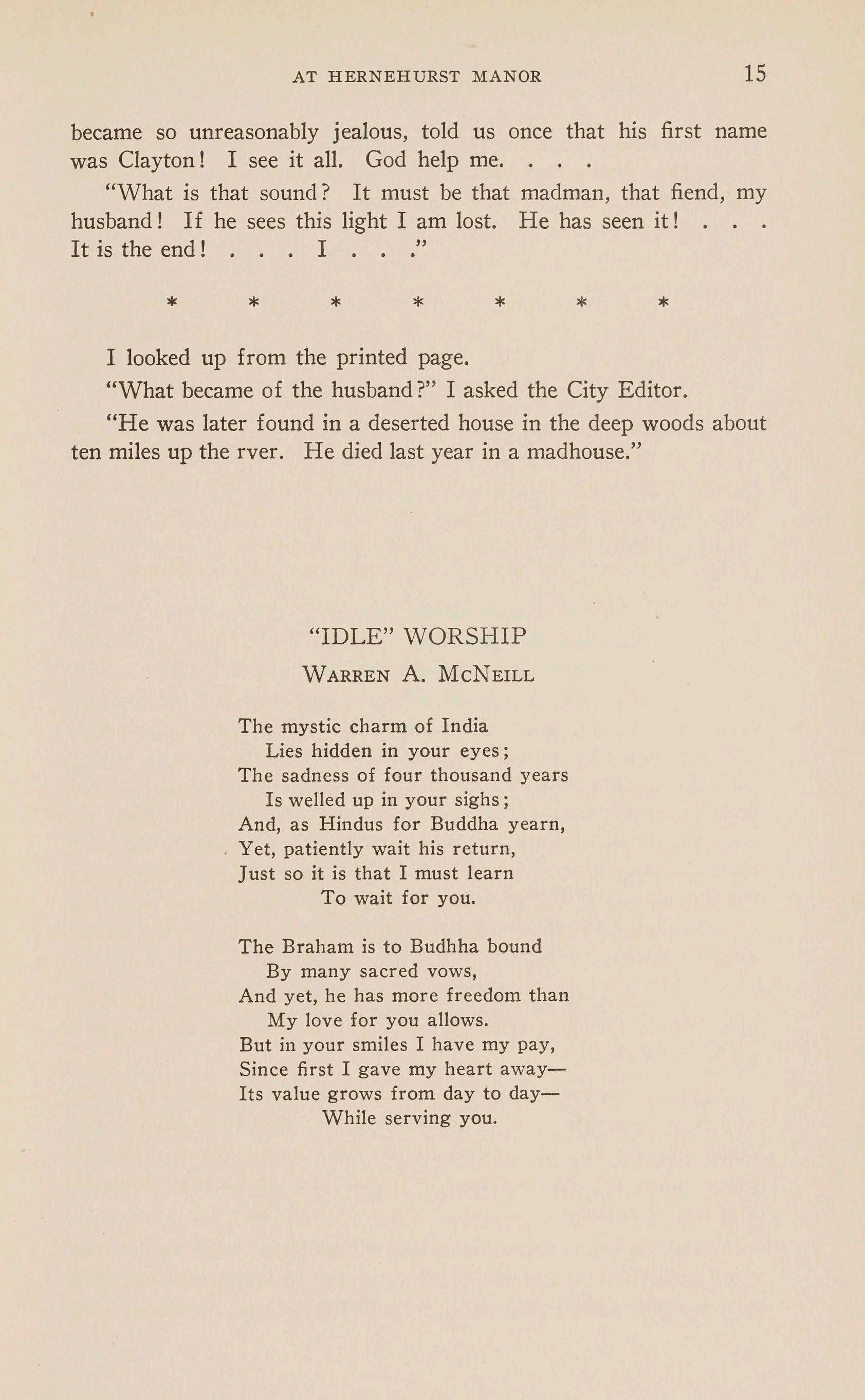
WARREN A. MCNEILL
The mystic charm of India Lies hidden in your eyes; The sadness of four thousand years Is welled up in your sighs; And, as Hindus for Buddha yearn, Yet, patiently wait his return, Just so it is that I must learn To wait for you.
The Braham is to Budhha bound By many sacred vows, And yet, he has more freedom than My love for you allows. But in your smiles I have my pay, Since first I gave my heart awayIts value grows from day to dayWhile serving you.

JEAN MAcCARTY
Roller coasters - clanging bells on fire engines -the wracking motion of tanks used during the war -saxophones - all these excruciating things come into the mind of one who has dwelt in an apartment house. They represent the type of pleasure you experience there. All the world knows that the only place for a person to live is in his own house, under his own roof. It is also highly desirable that his house be disconnected from that of his neighbor's, and that his dwelling be surrounded by his own yard enclosed in a fence. But suppose you are a poor innocent victim to the caprice of life. Chance and circumstance are determined to play tricks on you. You are jerked from the peace and quiet of your own home and forced to go through the outward and visible signs of living - in an apartment .
Now, perhaps you have never paused to consider the ~sthetic appeal of apartment architecture. Perhaps you are one of these hardened city dwellers who phlegmatically looks on while dozen upon dozen of brick walls spring up and take the shape of the monster known as an apartment. They are long, sinister brick walls with few windows. These walls appear right next to a person's home t Light and air are shut out. Sometimes a whole block of a beautiful street is a solid mass of these characterless buildings. Will no one ever stop them? They are like the spread of a desperate and inevitable prairie fire. No place is safe from them. You flee into a suburb and have vast expanses of waving brown grass surrounding you. At night you lie down and look from your window out to the clear stars. In the morning you wake up and have a new neighbor, an apartment, which has sprung up like a mushroom. You go into your garden, and even there you have no panorama but bricks and bricks t
Disagreeable as it ·is to drive along a boulevard ornamented by apartments, or to live next door to one, the supreme ecstasy seizes you when the hideous little sprite, Fate, leads you within the walls of the monster. Once within its jaws you experience all the delights which can be invented to enthrall a soul. All apartments are small after the freedom of your own home. Still you can endure the inconvenience. But when you are accustomed to see trees and sky from your windows, a landscape of bricks and mortar is not the most grateful sight imaginable. The pleasantest and most profitable

pastime to engage in during your sojourn in an apartment 1s an afternoon siesta or a night's continuous sleep. Upon a sluggish afternoon, when you think to forget the joys of life in a sweet slumber, you are startled by a cry, uttered in a high mushy yodle, "Sweet peashee, sweet peashee, sweet peashee !" Each "peashe-e" is a little more prolonged than the last. You rush over to the window and stare down into a cement court to discover the miscreant, a small black boy, going through numerous facial contortions to give the proper intonation to his "e"s. From various windows heads appear, and raucous voices call, "Wil-y-am," and inquire the price of his peaches. Other venders rush through the court at intervals shrieking, "Heigh-a, Irish potato, corn and tomato."
Having enjoyed your siesta to the fullest, you dress for the evening. About six o'clock a great calling of children ensues (and there are thousands of children in apartments). "Bar-ba-rah !" "Ma-ry !" The children scuffle madly up the steps to their respective mammas ! At supper time the pianola in the rear apartment commenced "Those Wabash Blues," a piece quite delectable and a la mode. This piece was either the favorite or the only piece the owners possessed, for it was repeated with fiendish violence throughout the evening. After you proceeded for a few minutes with supper the victrola in the side apartment was set in motion, playing Schubert's "Serenade" in fox-trot time. The budding artist overhead commenced her dutiful practice of scales. The symphony was completed by voices being uplifted in "Jerusalem the Golden." "A most enjoyable meal," you murmur, and scurry to the front porch. Here all is bliss. You are practically sitting in the sidewalk. Conversation is refreshing since you hear every third or fourth word. These precious words are drowned in the continuous flow of automobiles, and the maddening "honk" of their sirens.
As you get into bed you hear a frightful whoop of exultation from the rear apartment and you guess that a card game is under way. All night this is kept up with intermittent bursts of "Those Wabash Blues." After a series of catnaps you awake to a Sunday morning (the day of rest and relaxation) accompanied by a baseball game in the court under your window. Apartments and noise being synonymous terms, you live in a state of expectation, wondering what the next diversion will be. A most unusual feature of this system of noises is the unaccountable way in which bells ring. If you are in the kitchen you are terribly startled by the front door bell. If you sit in front of the door, expecting the bell to ring, you
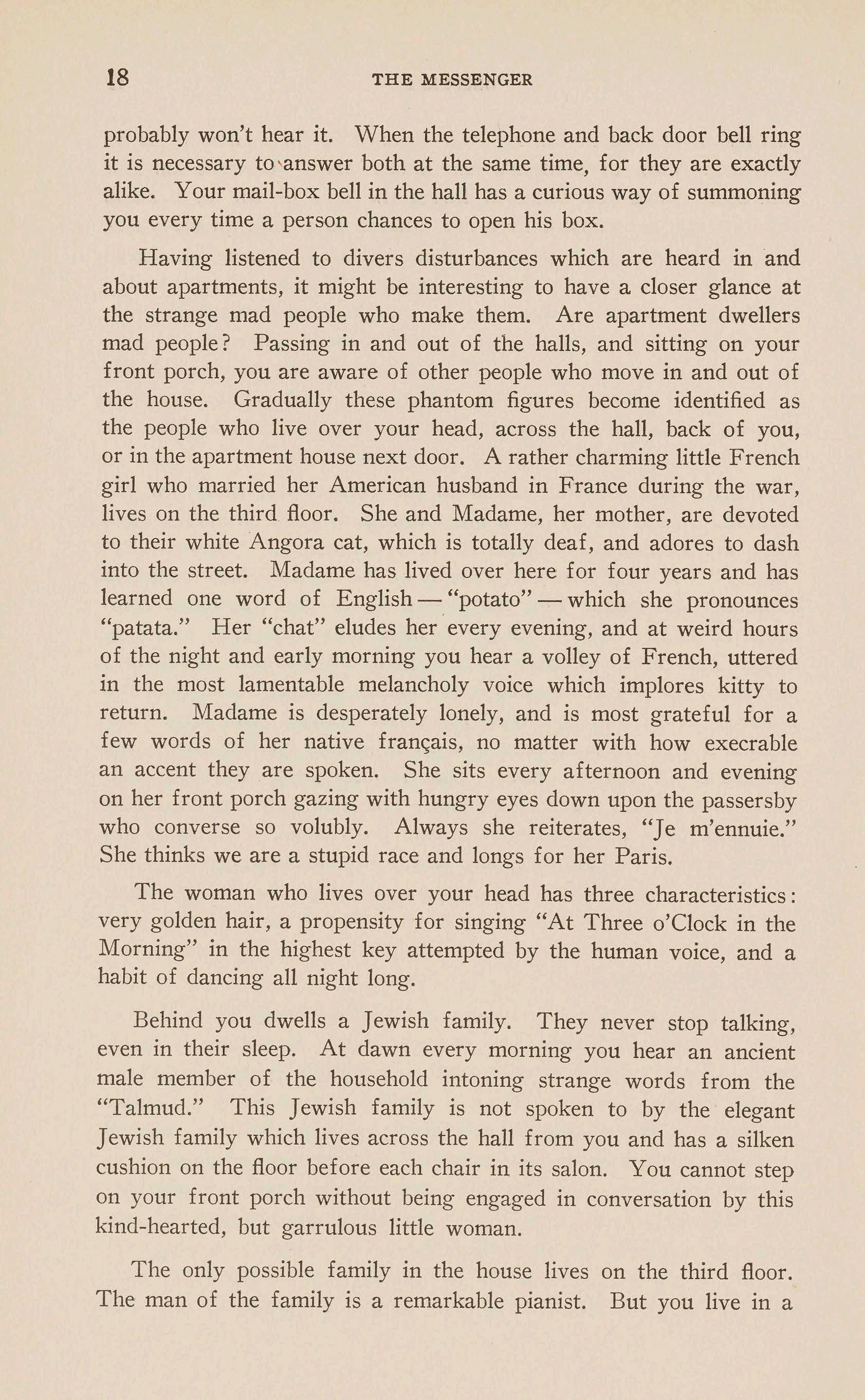
probably won't hear it. When the telephone and back door bell ring it is necessary to ,answer both at the same time, for they are exactly alike. Your mail-box bell in the hall has a curious way of summoning you every time a person chances to open his box.
Having listened to divers disturbances which are heard in and about apartments, it might be interesting to have a closer glance at the strange mad people who make them. Are apartment dwellers mad people? Passing in and out of the halls, and sitting on your front porch, you are aware of other people who move in and out of the house. Gradually these phantom figures become identified as the people who live over your head, across the hall, back of you, or in the apartment house next door. A rather charming little French girl who married her American husband in France during the war, lives on the third floor. She and Madame, her mother, are devoted to their white Angora cat, which is totally deaf, and adores to dash into the street. Madame has lived over here for four years and has learned one word of English-"potato" -which she pronounces "patata." Her "chat" eludes her ·every evening, and at weird hours of the night and early morning you hear a volley of French, uttered in the most lamentable melancholy voice which implores kitty to return. Madame is desperately lonely, and is most grateful for a few words of her native franc;ais, no matter with how execrable an accent they are spoken. She sits every afternoon and evening on her front porch gazing with hungry eyes down upon the passersby who converse so volubly. Always she reiterates, "Je m'ennuie." She thinks we are a stupid race and longs for her Paris.
The woman who lives over your head has three characteristics : very golden hair, a propensity for singing "At Three o'Clock in the Morning" in the highest key attempted by the human voice, and a habit of dancing all night long.
Behind you dwells a Jewish family. They never stop talking, even in their sleep. At dawn every morning you hear an ancient male member of the household intoning strange words from the "Talmud." This Jewish family is not spoken to by the elegant Jewish family which lives across the hall from you and has a silken cushion on the floor before each chair in its salon. You cannot step on your front porch without being engaged in conversation by this kind-hearted, but garrulous little woman.
The only possible family in the house lives on the third floor. The man of the family is a remarkable pianist. But you live in a
constant state of exasperation because you get waves of Chopin and "Those Wabash Blues" mixed up together.
The amazing part of an apartment is that all its inmates but yourself live in a Utopian state. They abandon themselves to a wild orgy of noise and revelry. They apparently don't know that they are not living-that it is all a hideous mockery. These people live in the confines of these buildings year after year. True, it is rather an easy life as far as responsibility goes. Perhaps, because these bare rooms are not theirs; because they live always with the possibility of moving tomorrow in mind, these apartment dwellers practice most effectively the philosophy of Omar Khayyam.

KATE RUCKER
One word, One look, And all is o'er. One wish, One kiss, A closed door. Heartbreak, Soulache, The day is done. Dull pain, Lost hope, The night is come .

My months slip by like crystal beads Slipped on a silver threadSo smooth and cold and colorless Now that love is dead.
I can watch them all alike Come and go, at willFebruary's mist-grey rains March winds on a hill.
April-May, but chill, clear beads Dulled of their flame and lightBlack river water pale with stars In June's brief fragrant night.
Emerald-Sapphire-Amethyst
So last year's months would pass, Topaz-Opal-Diamond dustThis year only glass.
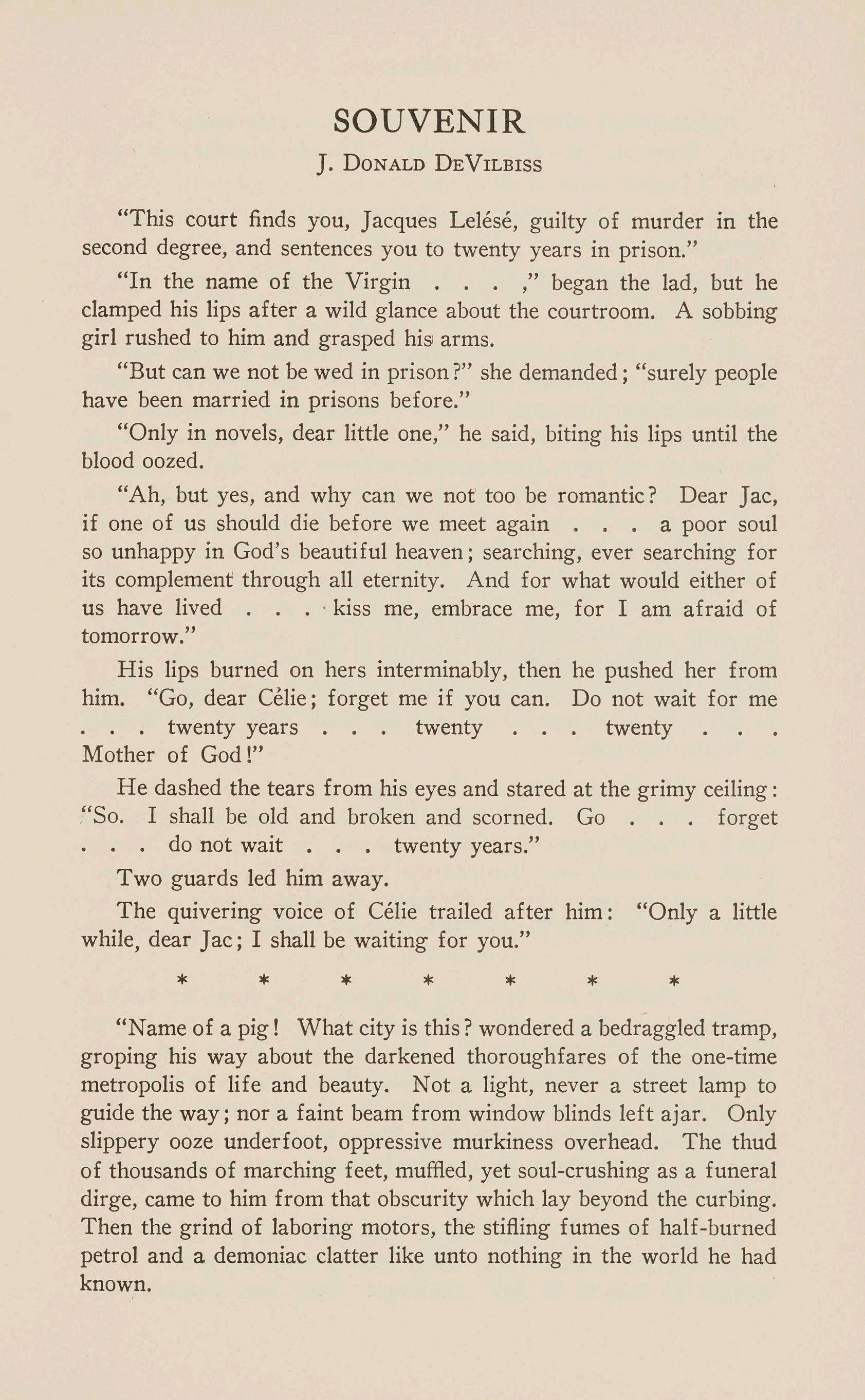
J. DONALD DEVILBISS
"This court finds you, Jacques Lelese, guilty of murder in the second degree, and sentences you to twenty years in prison."
"In the name of the Virgin . ," began the lad, but he clamped his lips after a wild glance about the courtroom. A sobbing girl rushed to him and grasped his arms.
"But can we not be wed in prison?" she demanded; "surely people have been married in prisons before."
"Only in novels, dear little one," he said, biting his lips until the blood oozed.
"Ah, but yes, and why can we not too be romantic? Dear Jae, if one of us should die before we meet again . . . a poor soul so unhappy in God's beautiful heaven; searching, ever searching for its complement through all eternity. And for what would either of us have lived . . · kiss me, embrace me, for I am afraid of tomorrow."
His lips burned on hers interminably, then he pushed her from him. "Go, dear Celie; forget me if you can. Do not wait for me . twenty years . twenty twenty Mother of God !"
He dashed the tears from his eyes and stared at the grimy ceiling : ,"So. I shall be old and broken and scorned. Go forget . . do not wait • . . twenty years."
Two guards led him away.
The quivering voice of Celie trailed after him : "Only a little while, dear Jae; I shall be waiting for you."
"Name of a pig! What city is this? wondered a bedraggled tramp, groping his way about the darkened thoroughfares of the one-time metropolis of life and beauty. Not a light, never a street lamp to guide the way; nor a faint beam from window blinds left ajar. Only slippery ooze underfoot, oppressive murkiness overhead. The thud of thousands of marching feet, muffled, yet soul-crushing as a funeral dirge, came to him from that obscurity which lay beyond the curbing. Then the grind of laboring motors, the stifling fumes of half-burned petrol and a demoniac clatter like unto nothing in the world he had known.
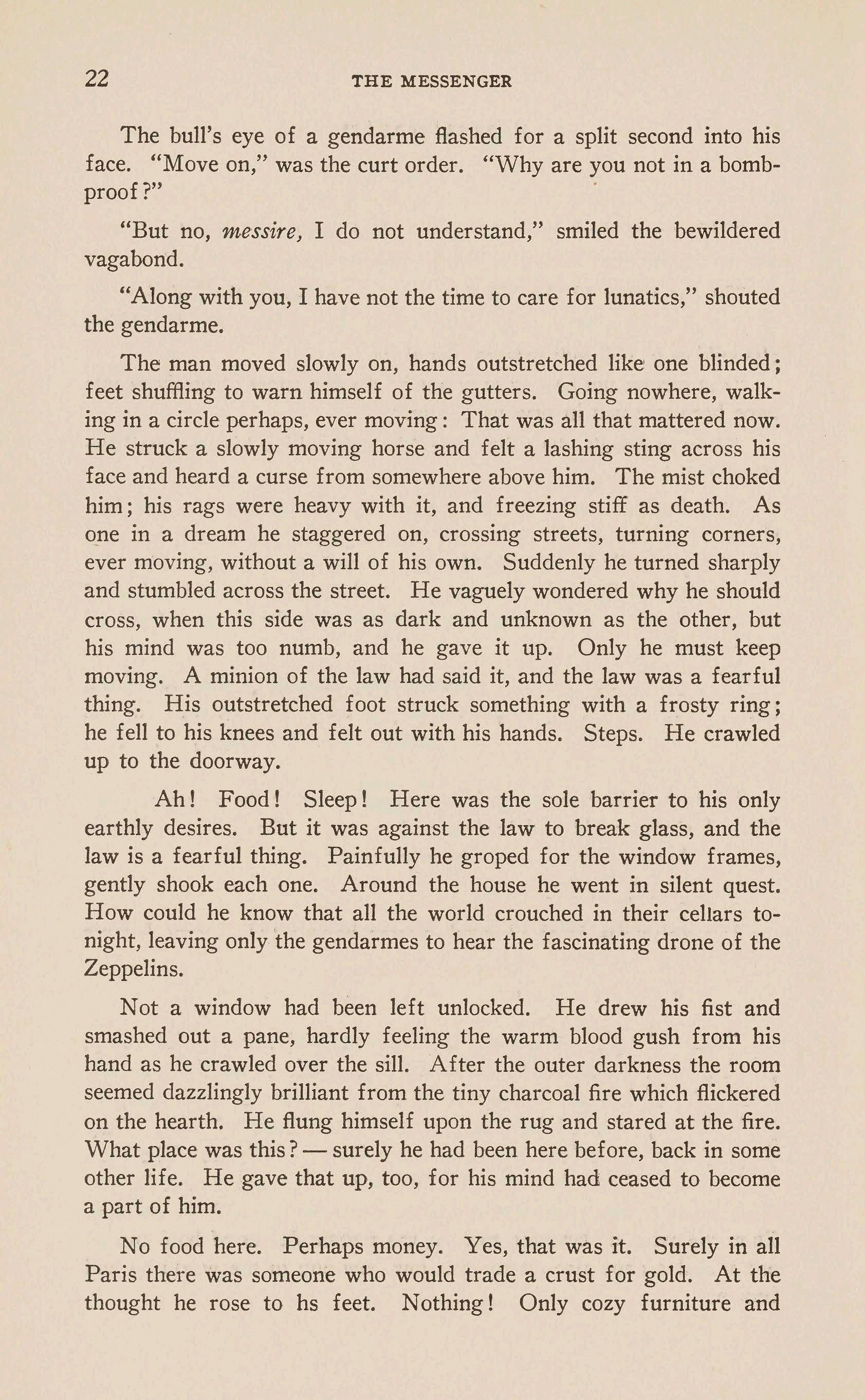
The bull's eye of a gendarme flashed for a split second into his face. "Move on," was the curt order. "Why are you not in a bombproof?" ·
"But no, messire, I do not understand," smiled the bewildered vagabond.
"Along with you, I have not the time to care for lunatics," shouted the gendarme.
The man moved slowly on, hands outstretched like one blinded; feet shuffling to warn himself of the gutters. Going nowhere, walking in a circle perhaps, ever moving: That was all that mattered now. He struck a slowly moving horse and felt a lashing sting across his face and heard a curse from somewhere above him. The mist choked him ; his rags were heavy with it, and freezing stiff as death. As one in a dream he staggered on, crossing streets, turning corners, ever moving, without a will of his own. Suddenly he turned sharply and stumbled across the street. He vaguely wondered why he should cross, when this side was as dark and unknown as the other, but his mind was too numb, and he gave it up. Only he must keep moving. A minion of the law had said it, and the law was a fearful thing. His outstretched foot struck something with a frosty ring; he fell to his knees and felt out with his hands. Steps. He crawled up to the doorway.
Ah ! Food ! Sleep! Here was the sole barrier to his only earthly desires. But it was against the law to break glass, and the law is a fearful thing. Painfully he groped for the window frames, gently shook each one. Around the house he went in silent quest. How could he know that all the world crouched in their cellars tonight, leaving only the gendarmes to hear the fascinating drone of the Zeppelins.
Not a window had been left unlocked. He drew his fist and smashed out a pane, hardly feeling the warm blood gush from his hand as he crawled over the sill. After the outer darkness the room seemed dazzlingly brilliant from the tiny charcoal fire which flickered on the hearth. He flung himself upon the rug and stared at the fire. What place was this? -surely he had been here before, back in some other life. He gave that up, too, for his mind had ceased to become a part of him.
No food here. Perhaps money. Yes, that was it. Surely in all Paris there was someone who would trade a crust for gold. At the thought he rose to hs feet. Nothing! Only cozy furniture and
specter shadows . there, on the mantel, a jar, an urnah ! Gold, jewels, food.
Saliva drooled from his blue lips as he held out trembling hands for the treasure. The top would not budge. He broke the neck and shook the contents into his open hand. Something sifted through his fingers; something light and elusive as a soul freed from the body. He stood transfixed for an eternity, it seemed, then fell to his knees and clawed madly about the dark corners of the hearth. Therethe top of the broken urn-'- a tarnished silver plate -initials -those initials! The last of the little pile of grey dust filtered through the other hand. In the name of the cross! The urn; the initials; the room, how well he remembered now, every chair, every picture. A voice and smile gone -a bit of broken china on the hearth rug; a slight change; who else would have noticed? High pitched, pealing, his laugh rang. "'This court finds you guilty-twenty yearsonly a little while -for what would the other have lived'"
The room reeled like a crazy top, and still he laughed.
Miles overhead a blond lad touched a lever.
Still another wild peal of laughter from the man who had broken in to find gold. A splintering, a crash, darting tongues of flame and a shower of bricks and dust.
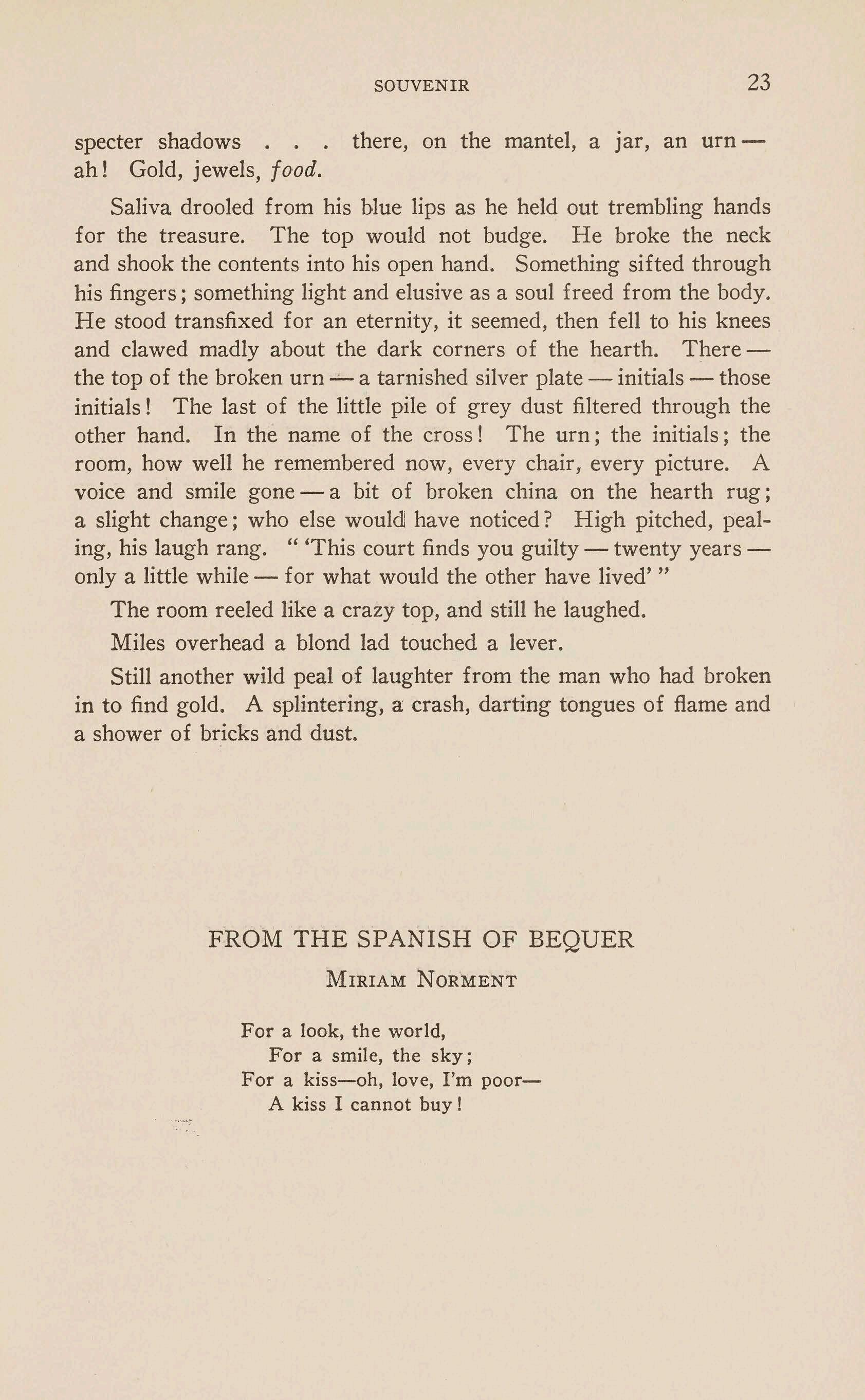
MIRIAM NORM ENT
For a look, the world, For a smile, the sky; For a kiss-oh, love, I'm poorA kiss I cannot buy!
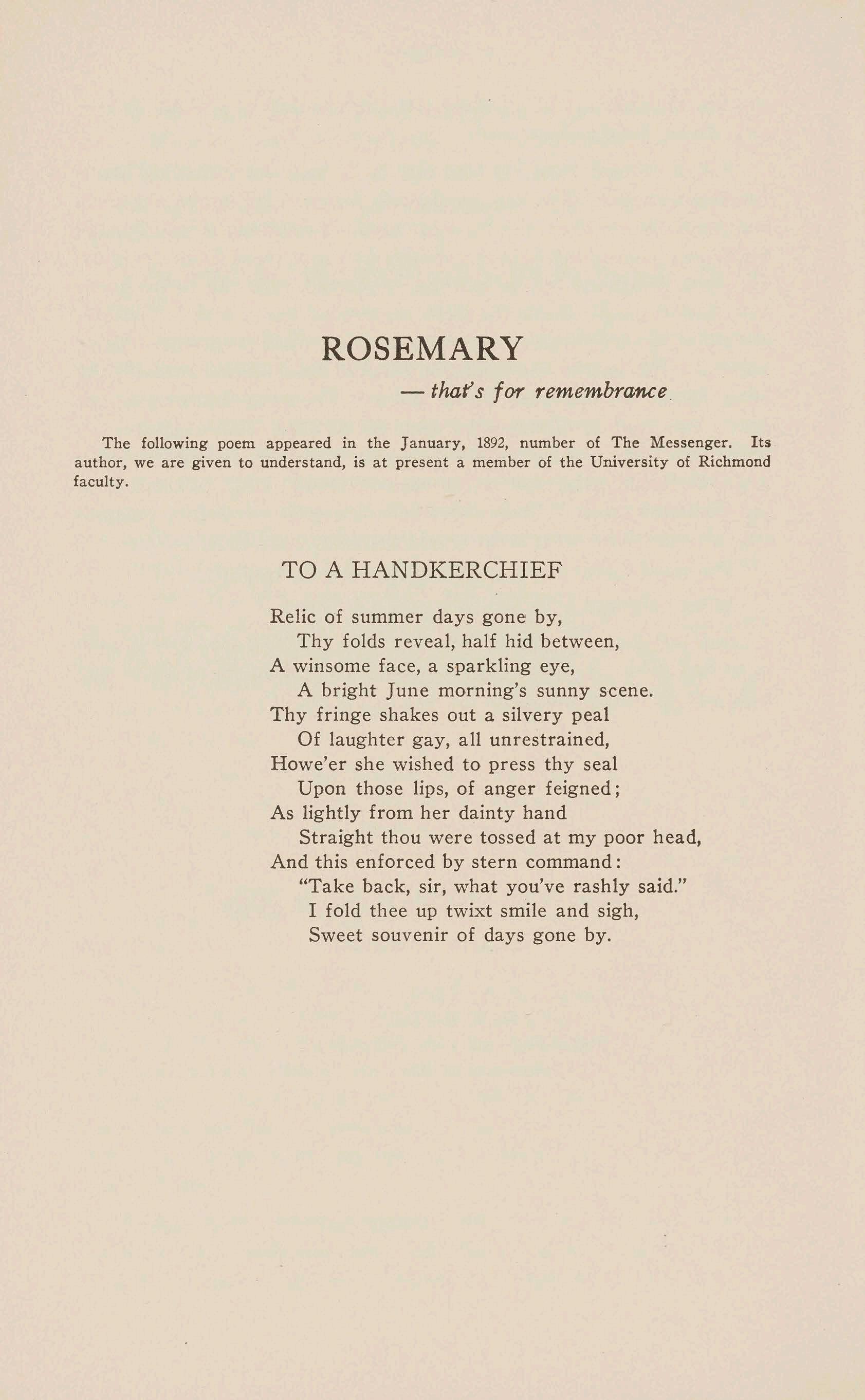
- that's for remembrance
The following poem appeared in the January, 1892, number of The Messenger. Its author, we are given to understand, is at present a member of the University of Richmond faculty.
Relic of summer days gone by, Thy folds reveal, half hid between, A winsome face, a sparkling eye, A bright June morning's sunny scene. Thy fringe shakes out a silvery peal Of laughter gay, all unrestrained, Howe'er she wished to press thy seal Upon those lips, of anger feigned; As lightly from her dainty hand Straight thou were tossed at my poor head, And this enforced by stern command: "Take back, sir, what you've rashly said." I fold thee up twixt smile and sigh, Sweet souvenir of days gone by.

MARGARET KNIGHT
As we walked along the road we meditated. Should we, then, give up all our anticipated pleasure and stay with her? But if we ended our plans, we could never let her know the sacrifice we had made.
An intently serious pig crossed the road in front of us. We thought of pigs. Pigs are really normal creatures. They have a pinkish kind of skin over them and legs which carry them about. They have a face with two eyes above a nose which is exaggerated, but nevertheless a nose, and they have a mouth containing teeth and a tongue. Yes, the pig is as normal a creature as we meet anywhere. But a pig is handicapped. From his earliest recollection he has had a long nose, and his fat body has been supported by stubby legs.
On these recognized facts, then, the pig has built his character. It would be difficult for him to carry his head in an elevated position. A long, large nose was designed by nature to drag in the dust. A fat body that is held up by short legs can never be a graceful object, nor can it ever be raised to very lo£ty heights by its own efforts. Suppose a pig could change his appearance. He might continue to blink out of ugly little eyes if he could change them for large soulful ones. Perhaps he would creep about with an unbeautiful body if it might be exchanged for one more perfect. It is difficult for a pig to be optimistic when his outlook on life is influenced by an obtruding nose. A pig roots in the earth because he has not been provided with hands to prepare his food. Would he crawl in the mud to go under a gate, if he had wings?
A pig stands motionless. In his mind does he assume wings and soar above the gate, to crawl under the gate only when his dreams break? Or is he a pig without wings? There are pigs who seem to have no wings, pigs that upon encountering a mud puddle deliberately wade through the dirty water instead of going around it. One cannot be certain that even these pigs are without wings. Perhaps upon entering the puddle they become in their minds snowy swans breasting crystal waves. Undoubtedly it is more pleasant to travel with the mental picture of a swan floating on clear waves than a pig ploughing through mud.
A pig roots in the earth. A pig without wings covers himself with dirt and feels that he is a dirty and unlovely object. A pig
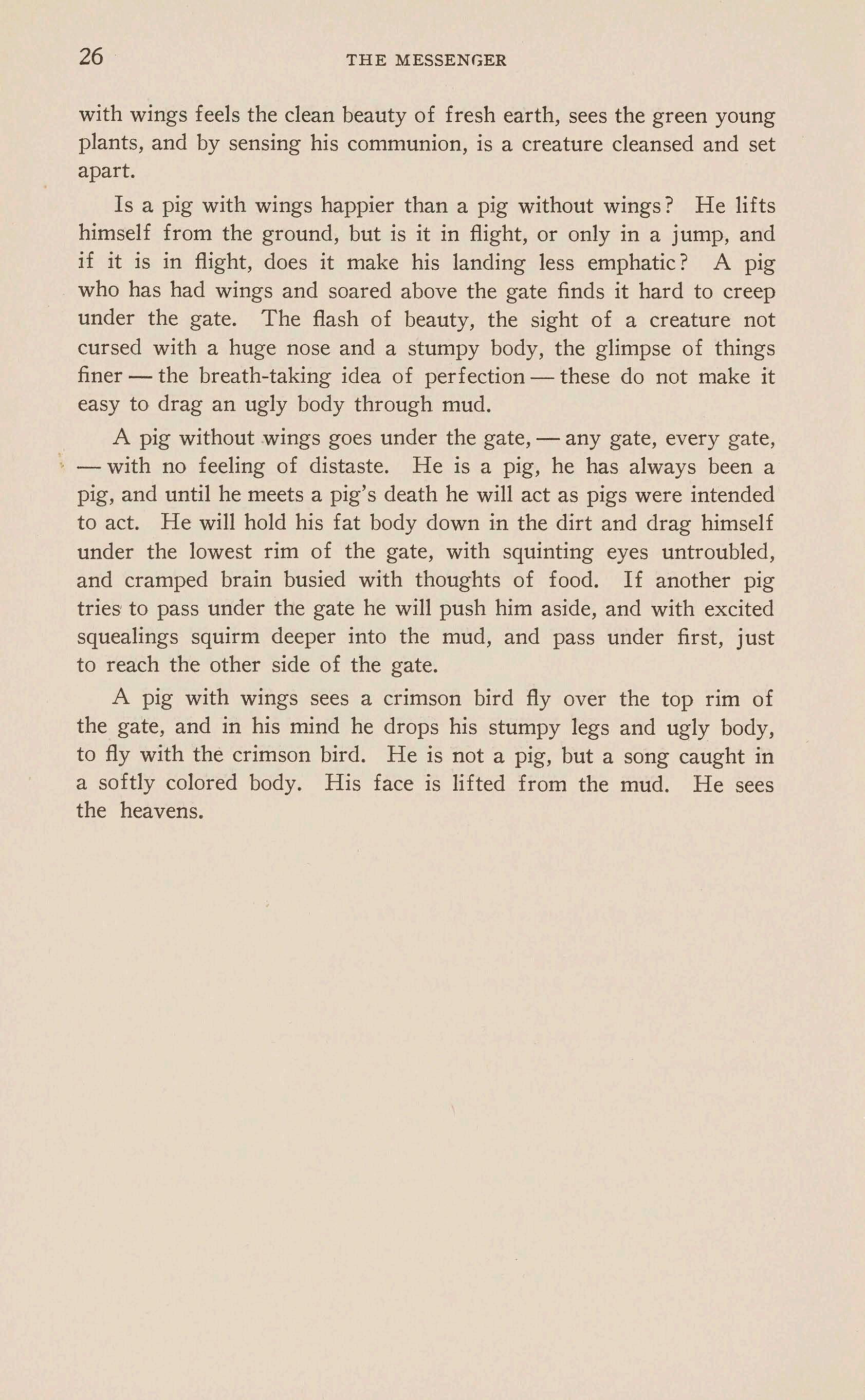
with wings feels the clean beauty of fresh earth, sees the green young plants, and by sensing his communion, is a creature cleansed and set apart.
Is a pig with wings happier than a pig without wings? He lifts himself from the ground, but is it in flight, or only in a jump, and if it is in flight, does it make his landing less emphatic? A pig who has had wings and soared above the gate finds it hard to creep under the gate. The flash of beauty, the sight of a creature not cursed with a huge nose and a stumpy body, the glimpse of things finer -the breath-taking idea of perfection -these do not make it easy to drag an ugly body through mud.
A pig without wings goes under the gate, -any gate, every gate, - with no feeling of distaste. He is a pig, he has always been a pig, and until he meets a pig's death he will act as pigs were intended to act. He will hold his fat body down in the dirt and drag himself under the lowest rim of the gate, with squinting eyes untroubled, and cramped brain busied with thoughts of food. If another pig tries to pass under the gate he will push him aside, and with excited squealings squirm deeper into the mud, and pass under first, just to reach the other side of the gate.
A pig with wings sees a crimson bird fly over the top rim of the gate, and in his mind he drops his stumpy legs and ugly body, to fly with the crimson bird. He is not a pig, but a song caught in a softly colored body. His face is lifted from the mud. He sees the heavens.
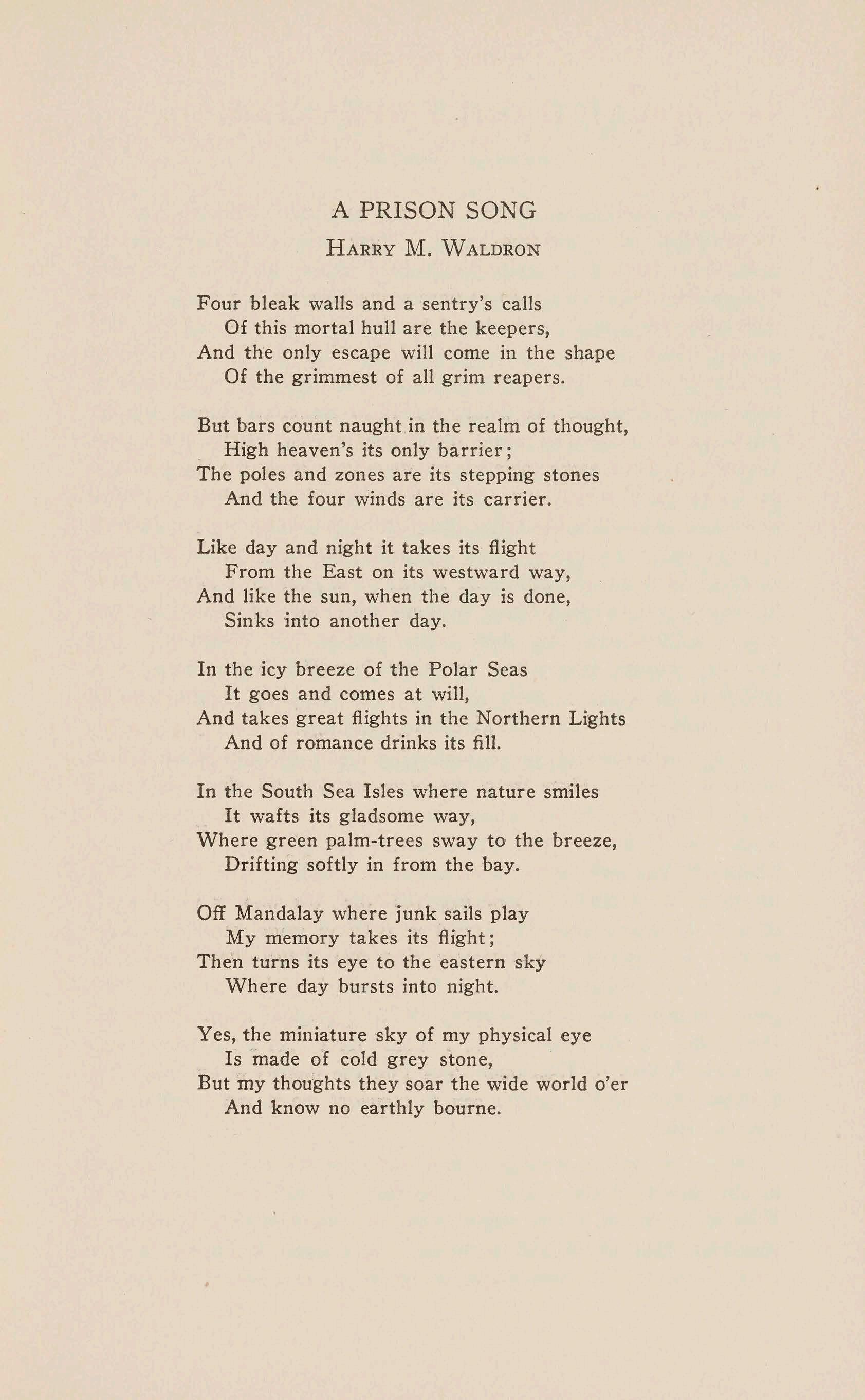
HARRY M. WALDRON
Four bleak walls and a sentry's calls Of this mortal hull are the keepers, And the only escape will come in the shape Of the grimmest of all grim reapers
But bars count naught in the realm of thought, High heaven's its only barrier ; The poles and zones are its stepping stones And the four winds are its carrier
Like day and night it takes its flight From the East on its westward way, And like the sun, when the day is done, Sinks into another day
In the icy breeze of the Polar Seas It goes and comes at will, And takes great flights in the Northern Lights And of romance drinks its fill.
In the South Sea Isles where nature smiles It wafts its gladsome way, Where green palm-trees sway to the breeze, Drifting softly in from the bay.
Off Mandalay where junk sails play My memory takes its flight; Then turns its eye to the eastern sky Where day bursts into night.
Yes, the miniature sky of my physical eye Is 'made of cold grey stone, But my thoughts they soar the wide world o'er And know no earthly bourne
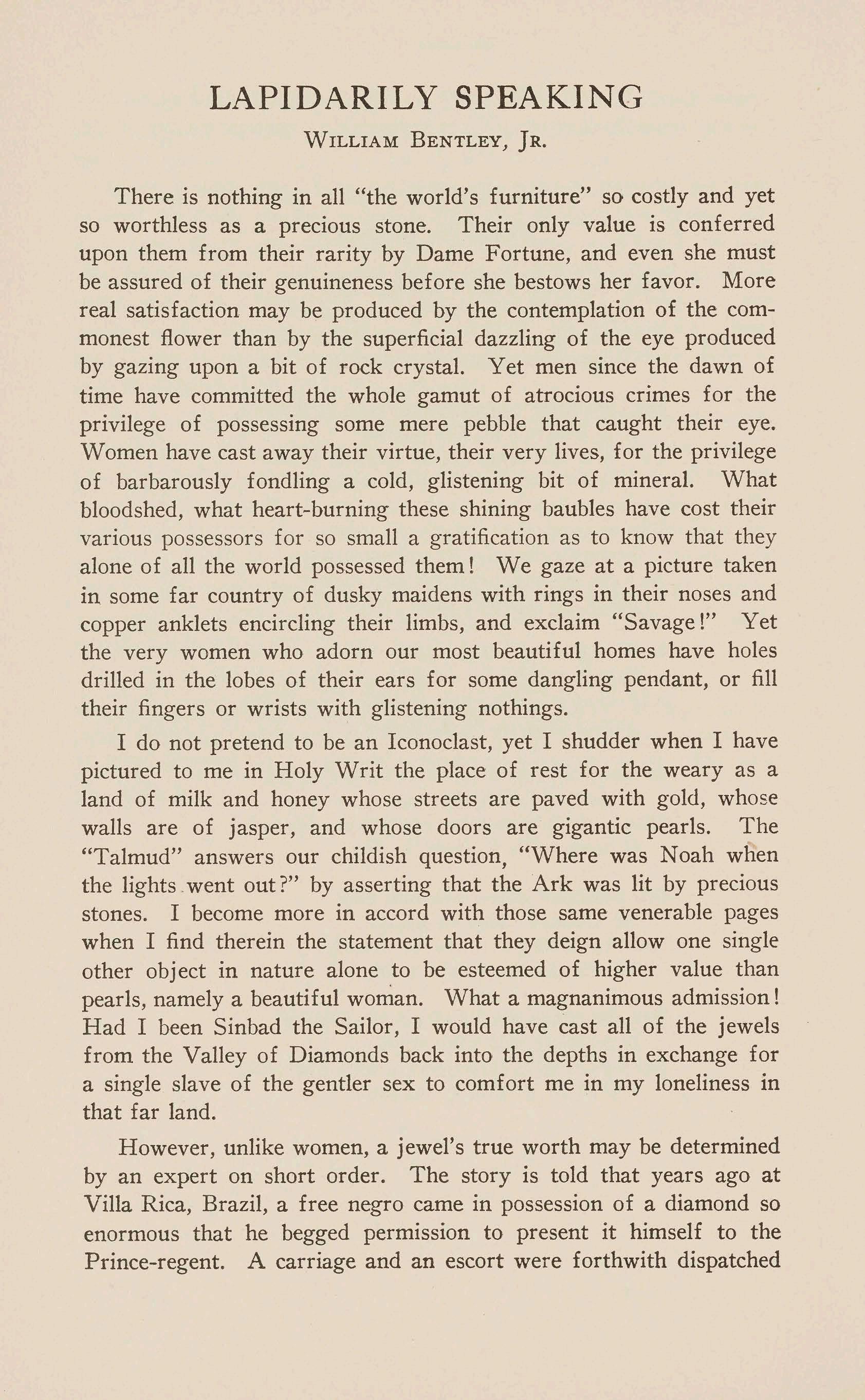
WILLIAM BENTLEY, JR.
There is nothing in all "the world's furniture" so costly and yet so worthless as a precious stone. Their only value is conferred upon them from their rarity by Dame Fortune, and even she must be assured of their genuineness before she bestows her favor. More real satisfaction may be produced by the contemplation of the commonest flower than by the superficial dazzling of the eye produced by gazing upon a bit of rock crystal. Yet men since the dawn of time have committed the whole gamut of atrocious crimes for the privilege of possessing some mere pebble that caught their eye. Women have cast away their virtue, their very lives, for the privilege of barbarously fondling a cold, glistening bit of mineral. What bloodshed, what heart-burning these shining baubles have cost their various possessors for so small a gratification as to know that they alone of all the world possessed them! We gaze at a picture taken in some far country of dusky maidens with rings in their noses and copper anklets encircling their limbs, and exclaim "Savage!" Yet the very women who adorn our most beautiful homes have holes drilled in the lobes of their ears for some dangling pendant, or fill their fingers or wrists with glistening nothings.
I do not pretend to be an Iconoclast, yet I shudder when I have pictured to me in Holy Writ the place of rest for the weary as a land of milk and honey whose streets are paved with gold, whose walls are of jasper, and whose doors are gigantic pearls. The "Talmud" answers our childish question, "Where was Noah when the lights .went out?" by asserting that the Ark was lit by precious stones. I become more in accord with those same venerable pages when I find therein the statement that they deign allow one single other object in nature alone to be esteemed of higher value than pearls, namely a beautiful woman. What a magnanimous admission! Had I been Sinbad the Sailor, I would have cast all of the jewels from the Valley of Diamonds back into the depths in exchange for a single slave of the gentler sex to comfort me in my loneliness in that far land.
However, unlike women, a jewel's true worth may be determined by an expert on short order. The story is told that years ago at Villa Rica, Brazil, a free negro came in possession of a diamond so enormous that he begged permission to present it himself to the Prince-regent. A carriage and an escort were forthwith dispatched
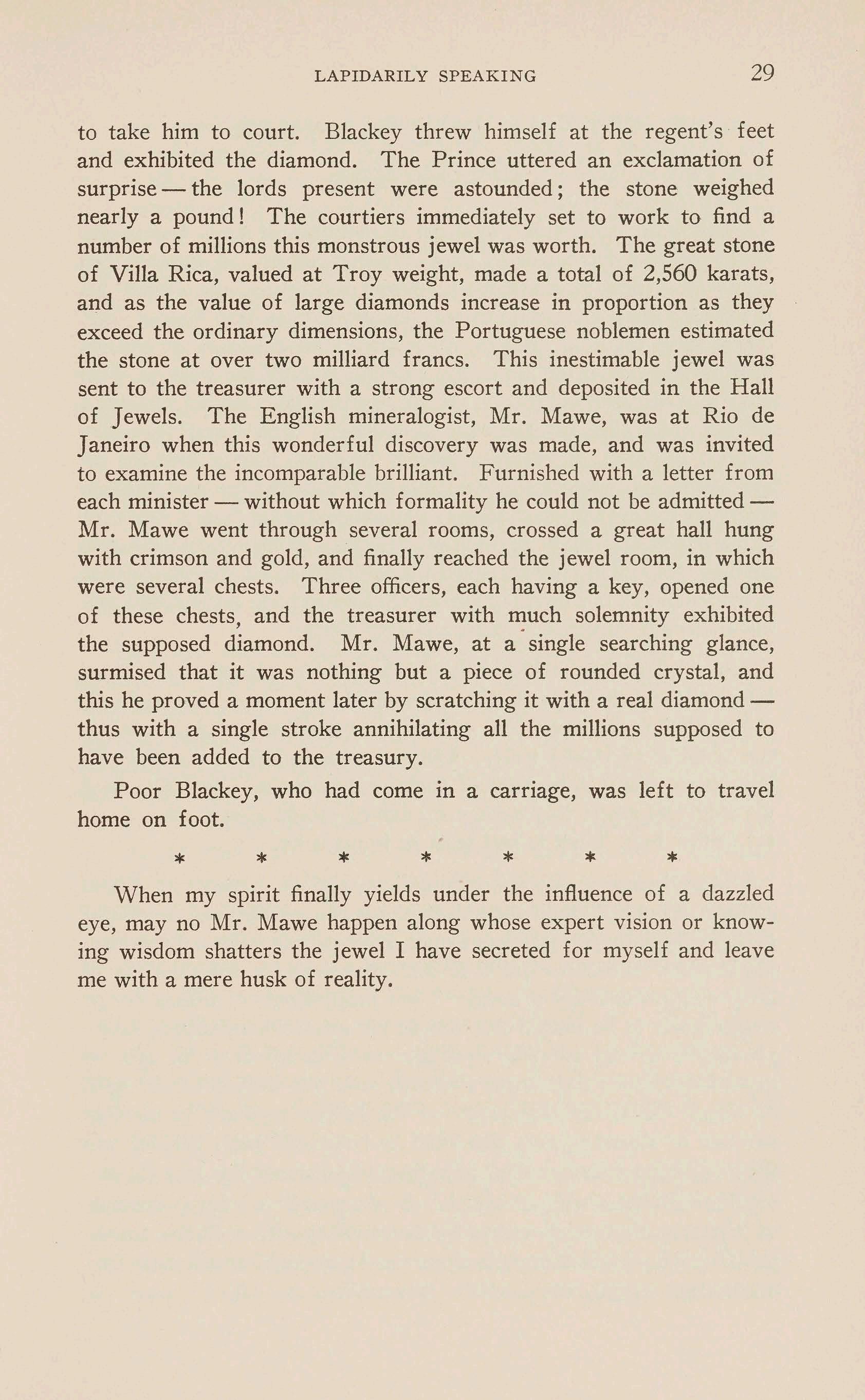
to take him to court. Blackey threw himself at the regent's feet and exhibited the diamond. The Prince uttered an exclamation of surprise -the lords present were astounded ; the stone weighed nearly a pound! The courtiers immediately set to work to find a number of millions this monstrous jewel was worth. The great stone of Villa Rica, valued at Troy weight, made a total of 2,560 karats, and as the value of large diamonds increase in proportion as they exceed the ordinary dimensions, the Portuguese noblemen estimated the stone at over two milliard francs. This inestimable jewel was sent to the treasurer with a strong escort and deposited in the Hall of Jewels. The English mineralogist, Mr. Mawe, was at Rio de Janeiro when this wonderful discovery was made, and was invited to examine the incomparable brilliant. Furnished with a letter from each minister -without which formality he could not be admittedMr. Mawe went through several rooms, crossed a great hall hung with crimson and gold, and finally reached the jewel room, in which were several chests. Three officers, each having a key, opened one of these chests, and the treasurer with ~uch solemnity exhibited the supposed diamond. Mr. Mawe, at a single searching glance, surmised that it was nothing but a piece of rounded crystal, and this he proved a moment later by scratching it with a real diamondthus with a single stroke annihilating all the millions supposed to have been added to the treasury.
Poor Blackey, who had come m a carriage, was left to travel home on foot.
When my spirit finally yields under the influence of a dazzled eye, may no Mr. Mawe happen along whose expert vision or knowing wisdom shatters the jewel I have secreted for myself and leave me with a mere husk of reality.
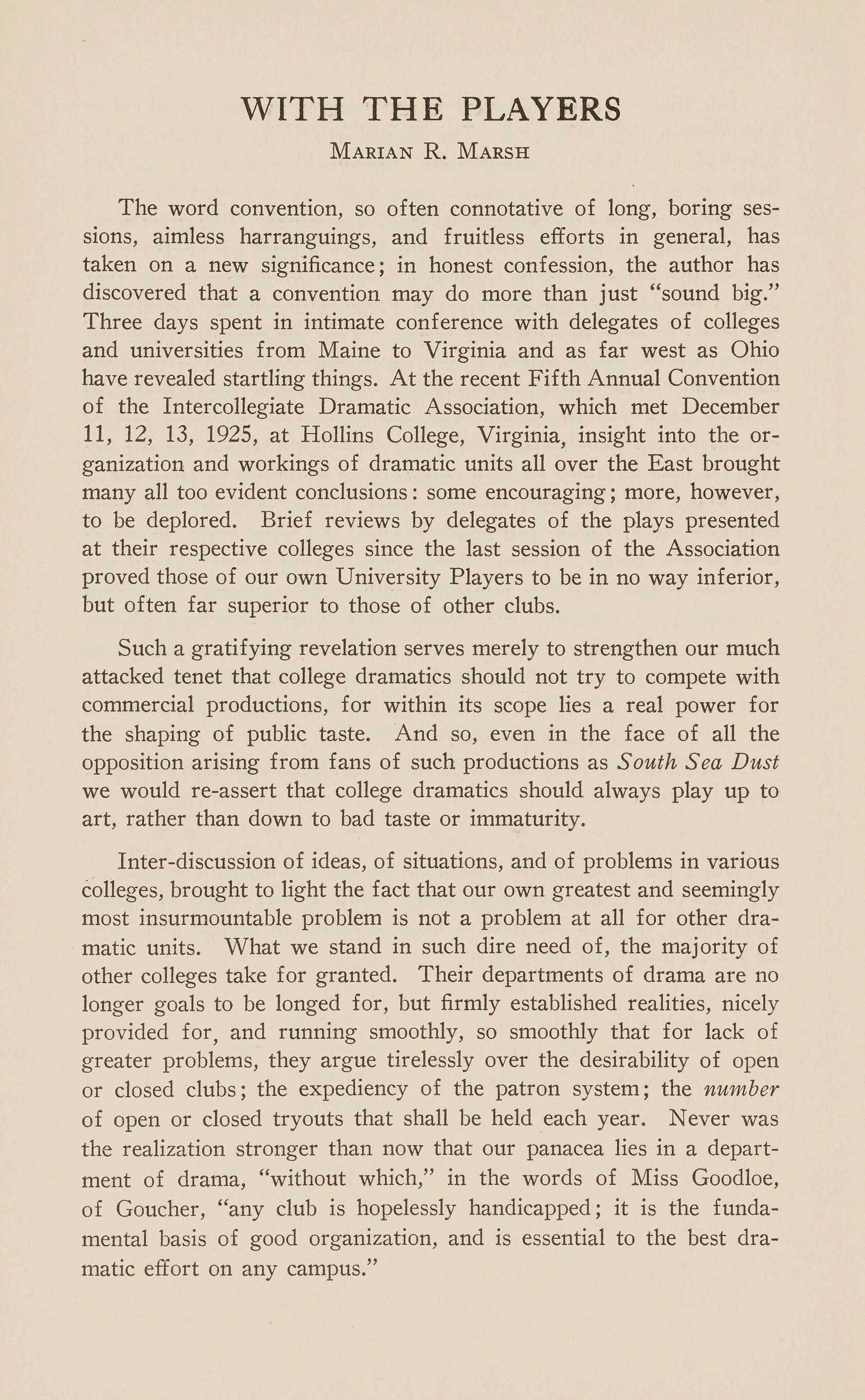
MARIAN R. MARSH
The word convention, so often connotative of long, boring sessions, aimless harranguings, and fruitless efforts in general, has taken on a new significance; in honest con£ession, the author has discovered that a convention may do more than just "sound big." Three days spent in intimate con£erence with delegates of colleges and universities from Maine to Virginia and as far west as Ohio have revealed startling things. At the recent Fifth Annual Convention of the Intercollegiate Dramatic Association, which met December 11, 12, 13, 1925, at Hollins College, Virginia, insight into the organization and workings of dramatic units all over the East brought many all too evident conclusions : some encouraging; more, however, to be deplored. Brief reviews by delegates of the plays presented at their respective colleges since the last session of the Association proved those of our own University Players to be in no way inferior, but of ten far superior to those of other clubs.
Such a gratifying revelation serves merely to strengthen our much attacked tenet that college dramatics should not try to compete with commercial productions, for within its scope lies a real power for the shaping of public taste. And so, even in the face of all the opposition arising from fans of such productions as South Sea Dust we would re-assert that college dramatics should always play up to art, rather than down to bad taste or immaturity.
Inter-discussion of ideas, of situations, and of problems in various colleges, brought to light the fact that our own greatest and seemingly most insurmountable problem is not a problem at all for other dramatic units. What we stand in such dire need of, the majority of other colleges take for granted. Their departments of drama are no longer goals to be longed for, but firmly established realities, nicely provided for, and running smoothly, so smoothly that for lack of greater problems, they argue tirelessly over the desirability of open or closed clubs; the expediency of the patron system; the number of open or closed tryouts that shall be held each year. Never was the realization stronger than now that our panacea lies in a department of drama, "without which," in the words of Miss Goodloe, of Goucher, "any club is hopelessly handicapped; it is the fundamental basis of good organization, and is essential to the best dramatic effort on any campus."
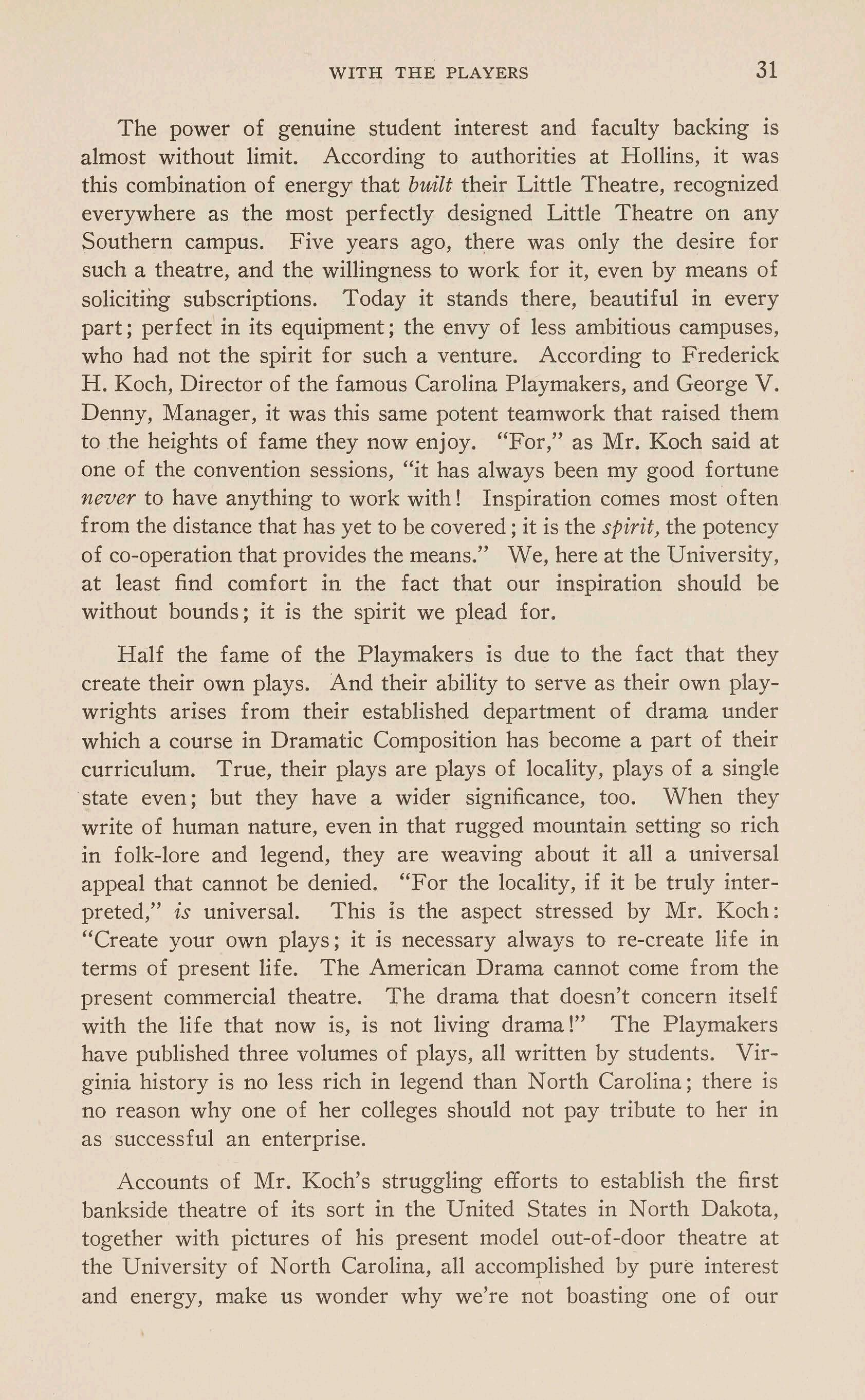
The power of genuine student interest and faculty backing is almost without limit. According to authorities at Hollins, it was this combination of energy that built their Little Theatre, recognized everywhere as the most perfectly designed Little Theatre on any Southern campus. Five years ago, th .ere was only the desire for such a theatre, and the willingness to work for it, even by means of soliciting subscriptions. Today it stands there, beautiful in every part; perfect in its equipment; the envy of less ambitious campuses, who had not the spirit for such a venture. According to Frederick H. Koch, Director of the famous Carolina Playmakers, and George V. Denny, Manager, it was this same potent teamwork that raised them to the heights of fame they now enjoy. "For," as Mr. Koch said at one of the convention sessions, "it has always been my good fortune never to have anything to work with! Inspiration comes most often from the distance that has yet to be covered ; it is the spirit, the potency of co-operation that provides the means." We, here at the University, at least find comfort in the fact that our inspiration should be without bounds; it is the spirit we plead for.
Half the fame of the Playmakers is due to the fact that they create their own plays. And their ability to serve as their own playwrights arises from their established department of drama under which a course in Dramatic Composition has become a part of their curriculum. True, their plays are plays of locality, plays of a single ·state even; but they have a wider significance, too. When they write of human nature, even in that rugged mountain setting so rich in folk-lore and legend, they are weaving about it all a universal appeal that cannot be denied. "For the locality, if it be truly interpreted," is universal. This is the aspect stressed by Mr. Koch : "Create your own plays; it is necessary always to re-create life in terms of present Ii£e. The American Drama cannot come from the present commercial theatre. The drama that doesn't concern itself with the life that now is, is not living drama!" The Playmakers have published three volumes of plays, all written by students. Virginia history is no less rich in legend than North Carolina ; there is no reason why one of her colleges should not pay tribute to he r in as successful an enterprise.
Accounts of Mr. Koch's struggling efforts to establish the first bankside theatre of its sort in the United States in North Dakota, together with pictures of his present model out-of-door theatre at the University of North Carolina, all accomplished by pure intere st and energy, make us wonder why we're not boasting one of our
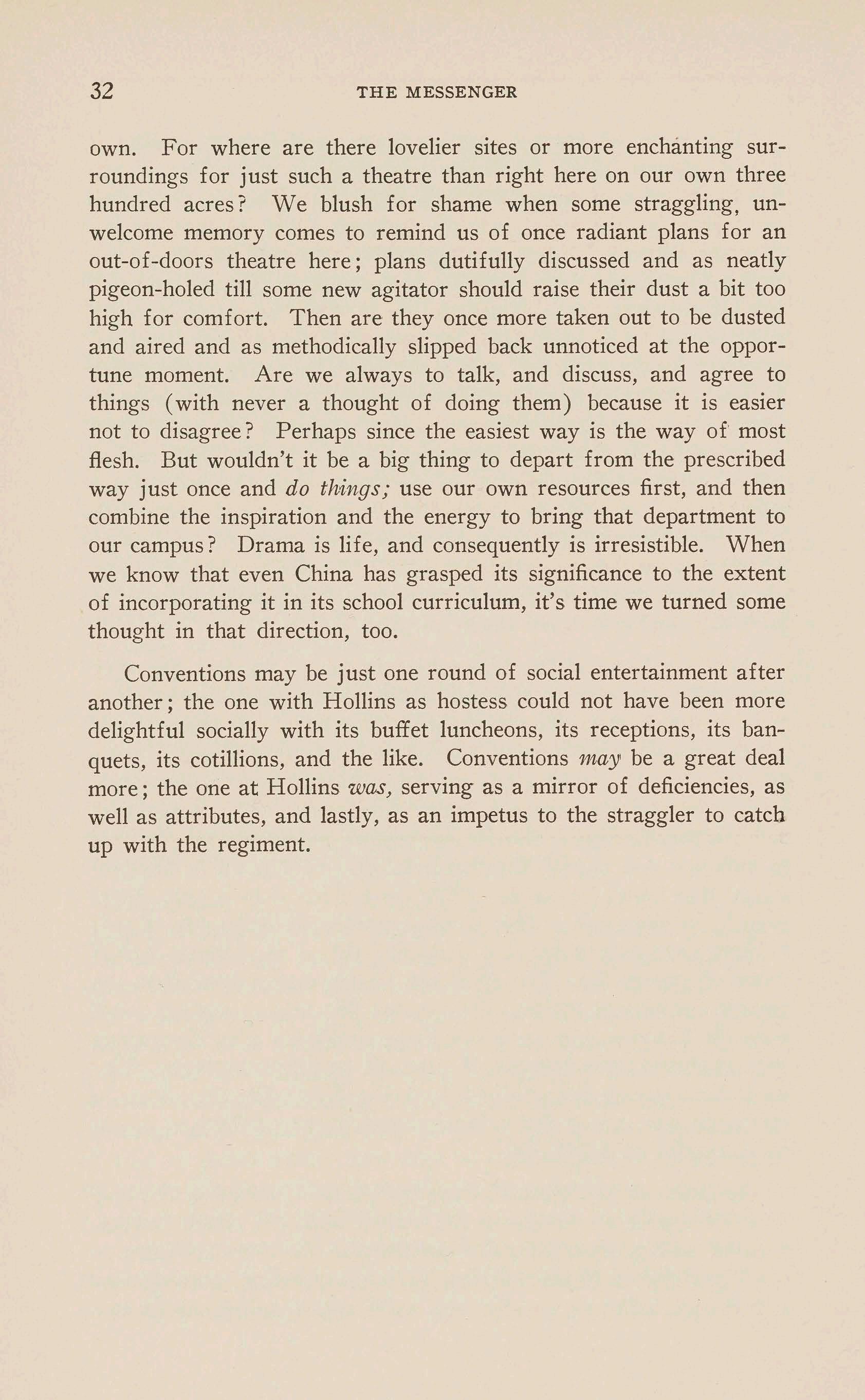
own. For where are there lovelier sites or more enchanting surroundings for just such a theatre than right here on our own three hundred acres? We blush for shame when some straggling, unwelcome memory comes to remind us of once radiant plans for an out-of-doors theatre here; plans dutifully discussed and as neatly pigeon-holed till some new agitator should raise their dust a bit too high for comfort. Then are they once more taken out to be dusted and aired and as methodically slipped back unnoticed at the opportune moment. Are we always to talk, and discuss, and agree to things ( with never a thought of doing them) because it is easier not to disagree? Perhaps since the easiest way is the way of most flesh. But wouldn't it be a big thing to depart from the prescribed way just once and do things; use our own resources first, and then combine the inspiration and the energy to bring that department to our campus? Drama is life, and consequently is irresistible. When we know that even China has grasped its significance to the extent of incorporating it in its school curriculum, it's time we turned some thought in that direction, too.
Conventions may be just one round of social entertainment after another; the one with Hollins as hostess could not have been more delightful socially with its buffet luncheons, its receptions, its banquets, its cotillions, and the like. Conventions may be a great deal more ; the one at Hollins was, serving as a mirror of deficiencies, as well as attributes, and lastly, as an impetus to the straggler to catch up with the regiment.
STUART McGUIRE, M. D.,
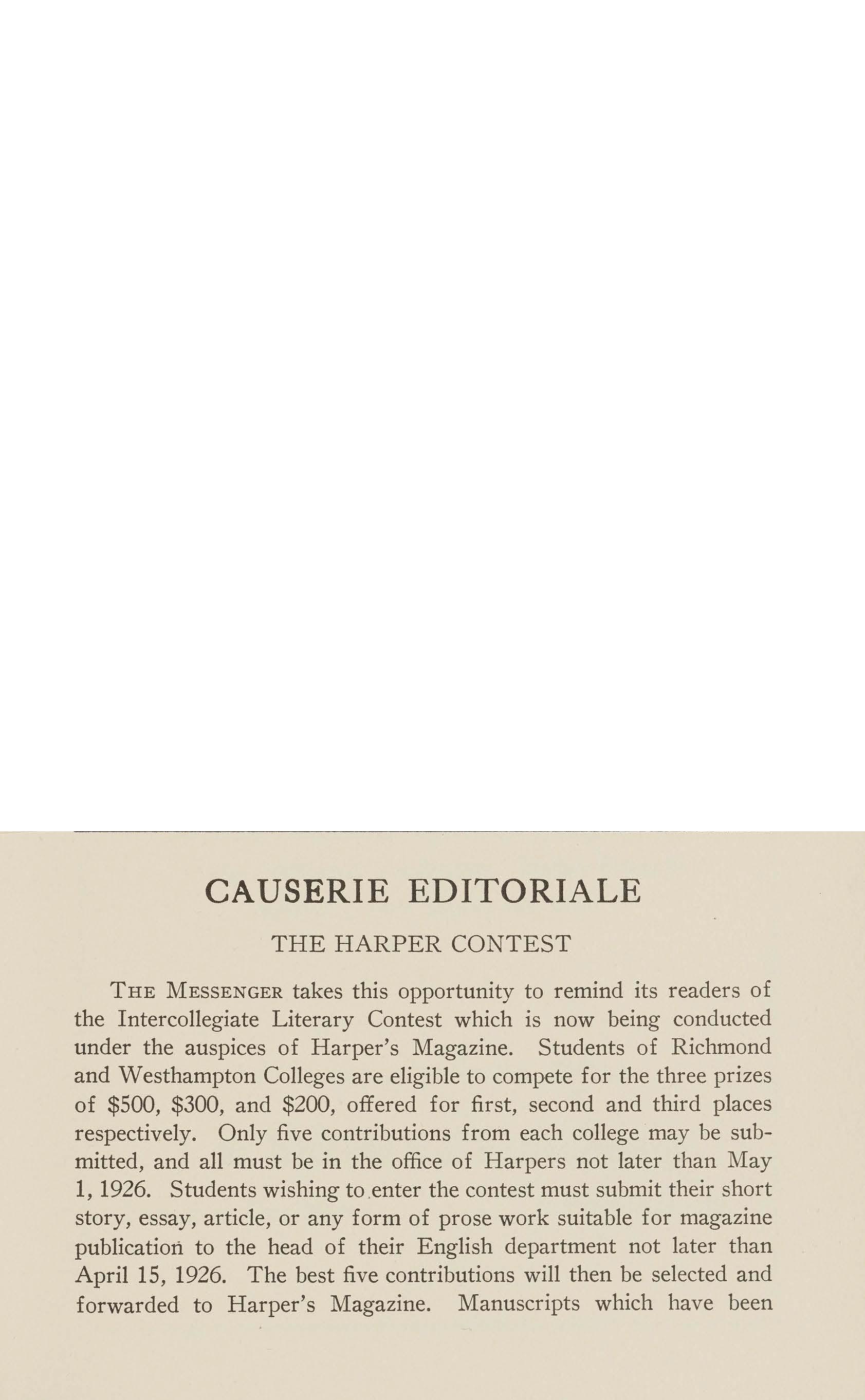
New College Building, Completely Equipped and Modern Laboratories, Extensive Dispensary Service. Hospital Facilities Furnish 400 Clini-
THE MESSENGERtakes this opportunity to remind its readers of the Intercollegiate Literary Contest which is now being conducted under the auspices of Harper's Magazine. Students of Richmond and Westhampton Colleges are eligible to compete for the three prizes of $500, $300, and $200, offered for first, second and third places respectively. Only five contributions from each college may be submitted, and all must be in the office of Harpers not later than May 1, 1926. Students wishing to .enter the contest must submit their short story, essay, article, or any form of prose work suitable for magazine publication to the head of their English department not later than April 15, 1926. The best five contributions will then be selected and forwarded to Harper's Magazine. Manuscripts which have been

own. For where are there lovelier sites or more enchanting surroundings for just such a theatre than right here on our own three hundred acres? We blush for shame when some straggling, unwelcome memory comes to remind us of once radiant plans for an out-of-doors theatre here; plans dutifully discussed and as neatly pigeon-holed till some new agitator should raise their dust a bit too high for comfort. Then are they once more taken out to be dusted and aired and as methodically slipped back unnoticed at the opportune moment. Are we always to talk, and discuss, and agree to things ( with never a thought of doing them) because it is easier not to disagree? Perhaps since the easiest way is the way of' most flesh. But wouldn't it be a big thing to depart from the prescribed way just once and do thi ngs; use our own resources first, and then combine the inspiration and the energy to bring that department to our campus? Drama is life, and consequently is irresistible. When we know that even China has grasped its significance to the extent of incorporating it in its school curriculum, it's time we turned some thought in that direction, too. Conventions may be just one round of social entertainment after another; the one with Hollins as hostess could not have been more delightful socially with its buffet luncheons, its receptions, its banquets, its cotillions, and the like. Conventions may be a great deal more; the one at Hollins was, serving as a mirror of deficiencies, as well as attributes, and lastly, as an impetus to the straggler to catch
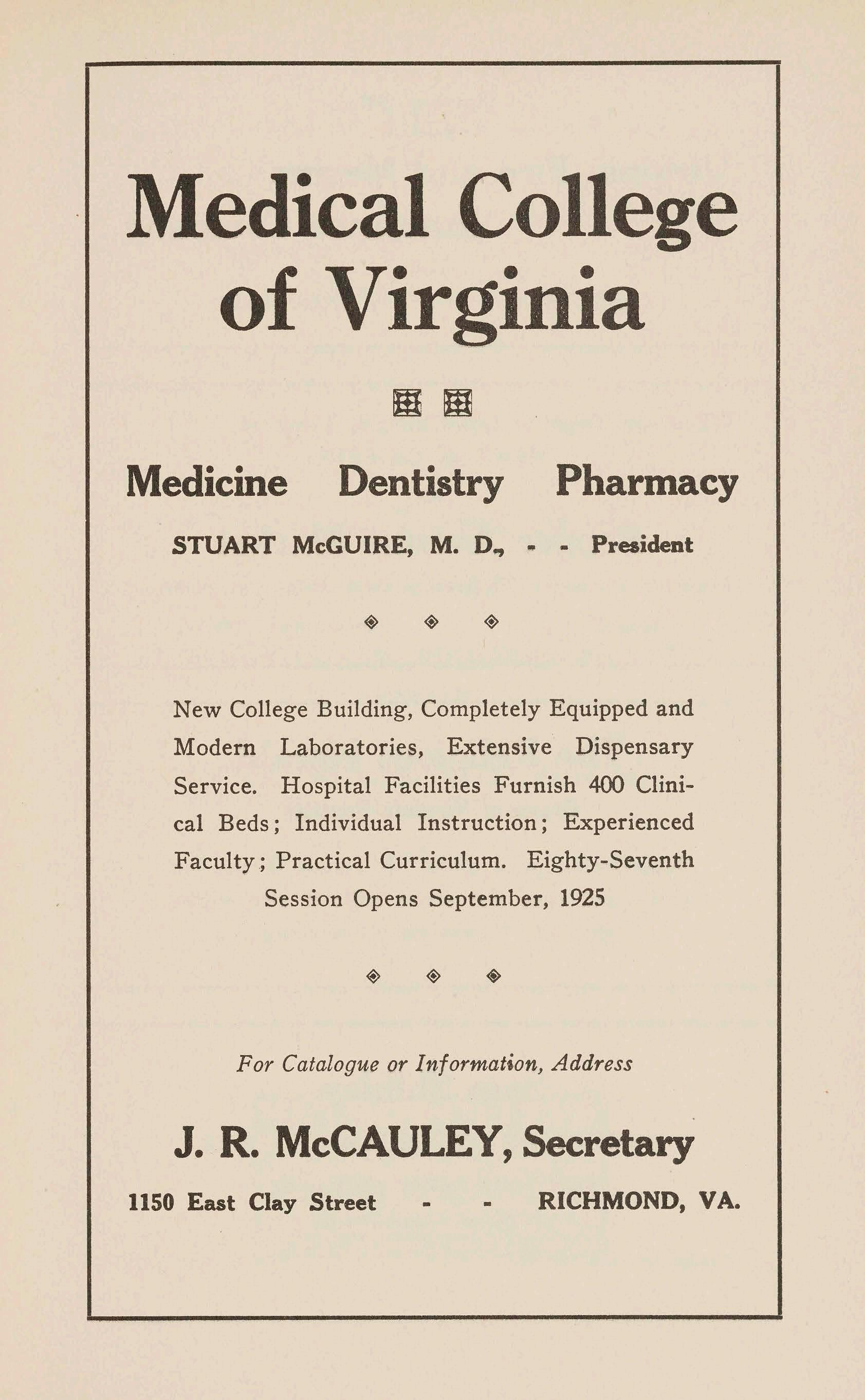
New College Building, Completely Equipped and Modern Laboratories, Extensive Dispensary Service. Hospital Facilities Furnish 400 Clinical Beds ; Individual Instruction ; Experienced Faculty; Practical Curriculum. Eighty-Seventh Session Opens September, 1925 For Catalogue or Information, Address
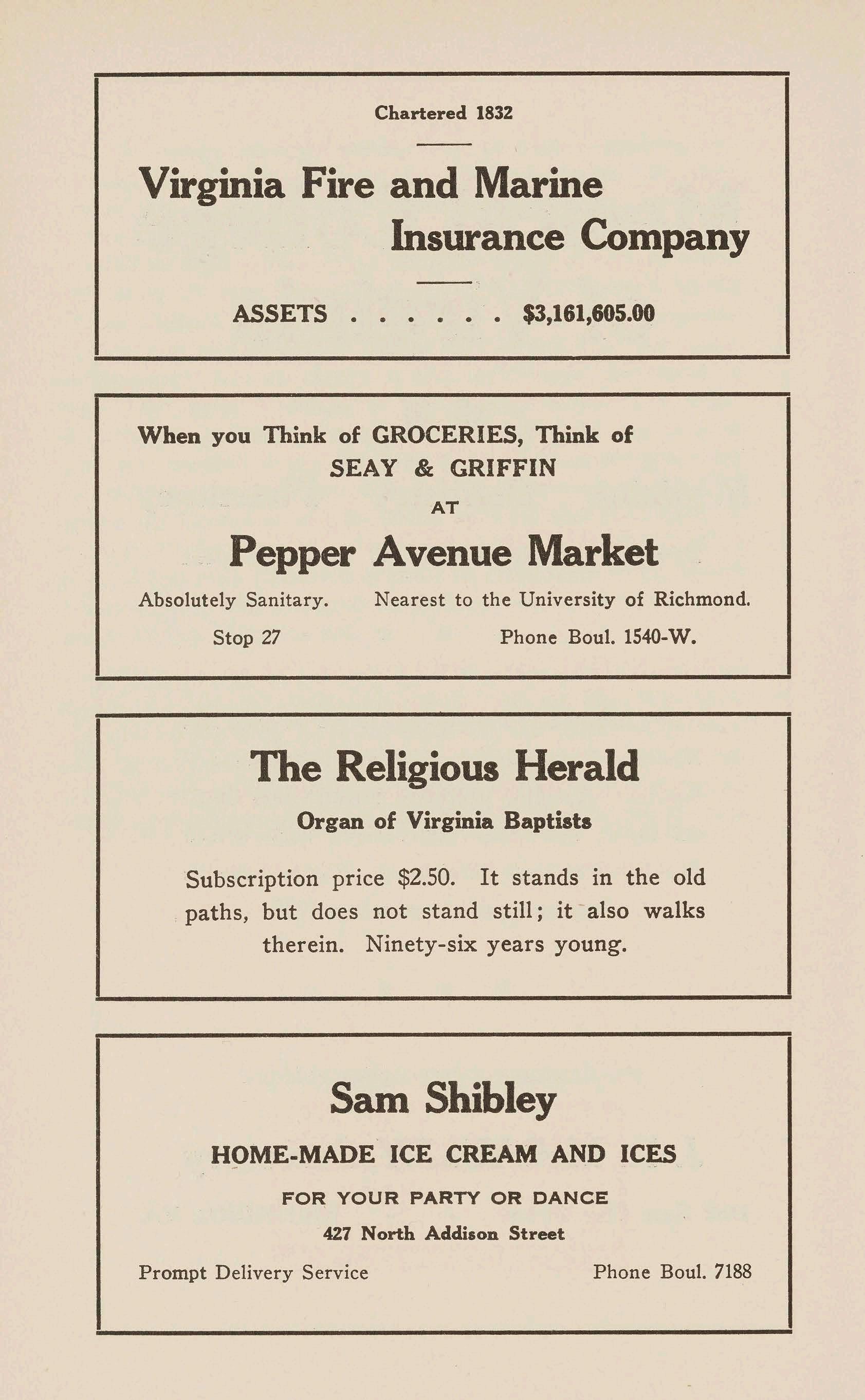

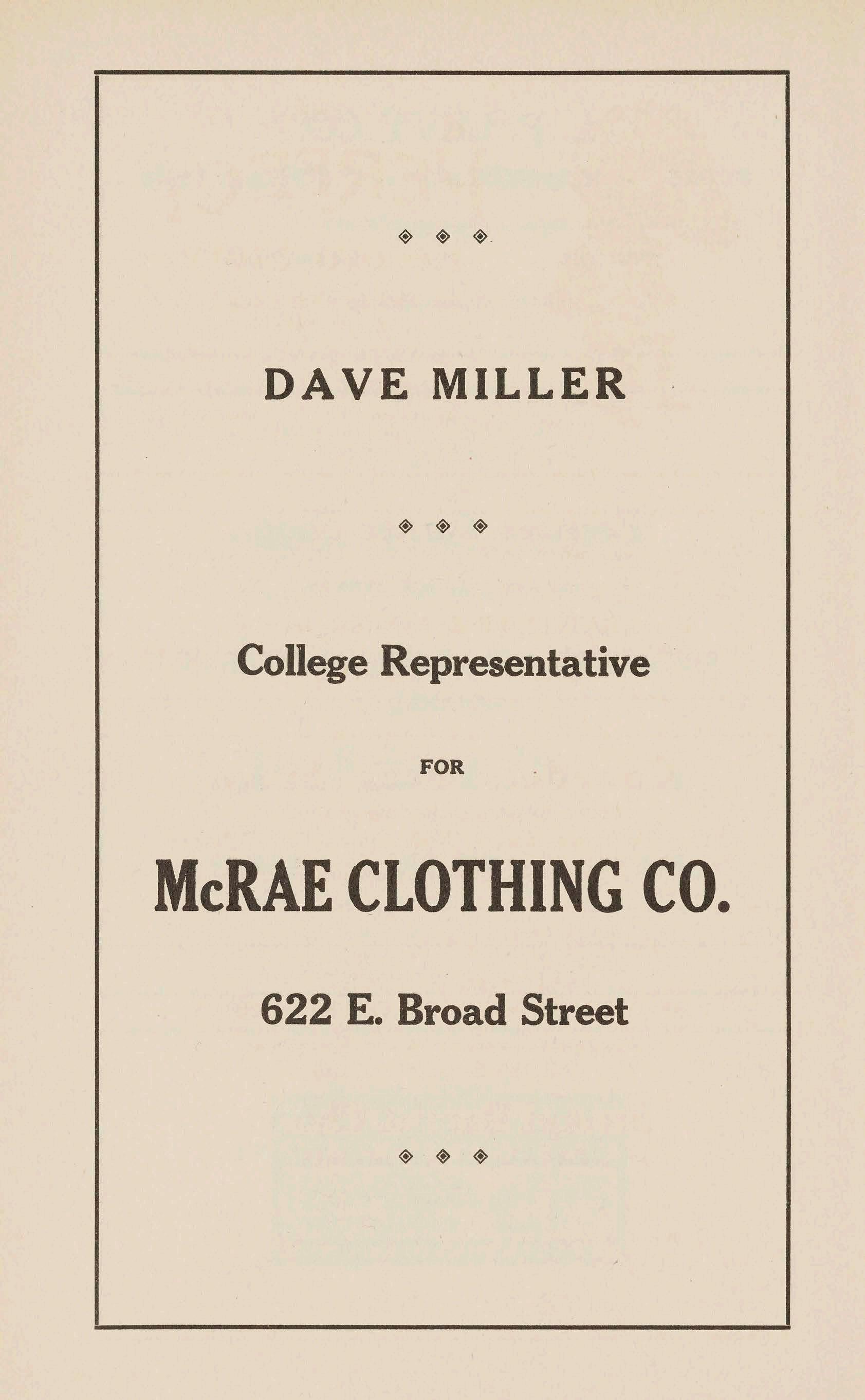
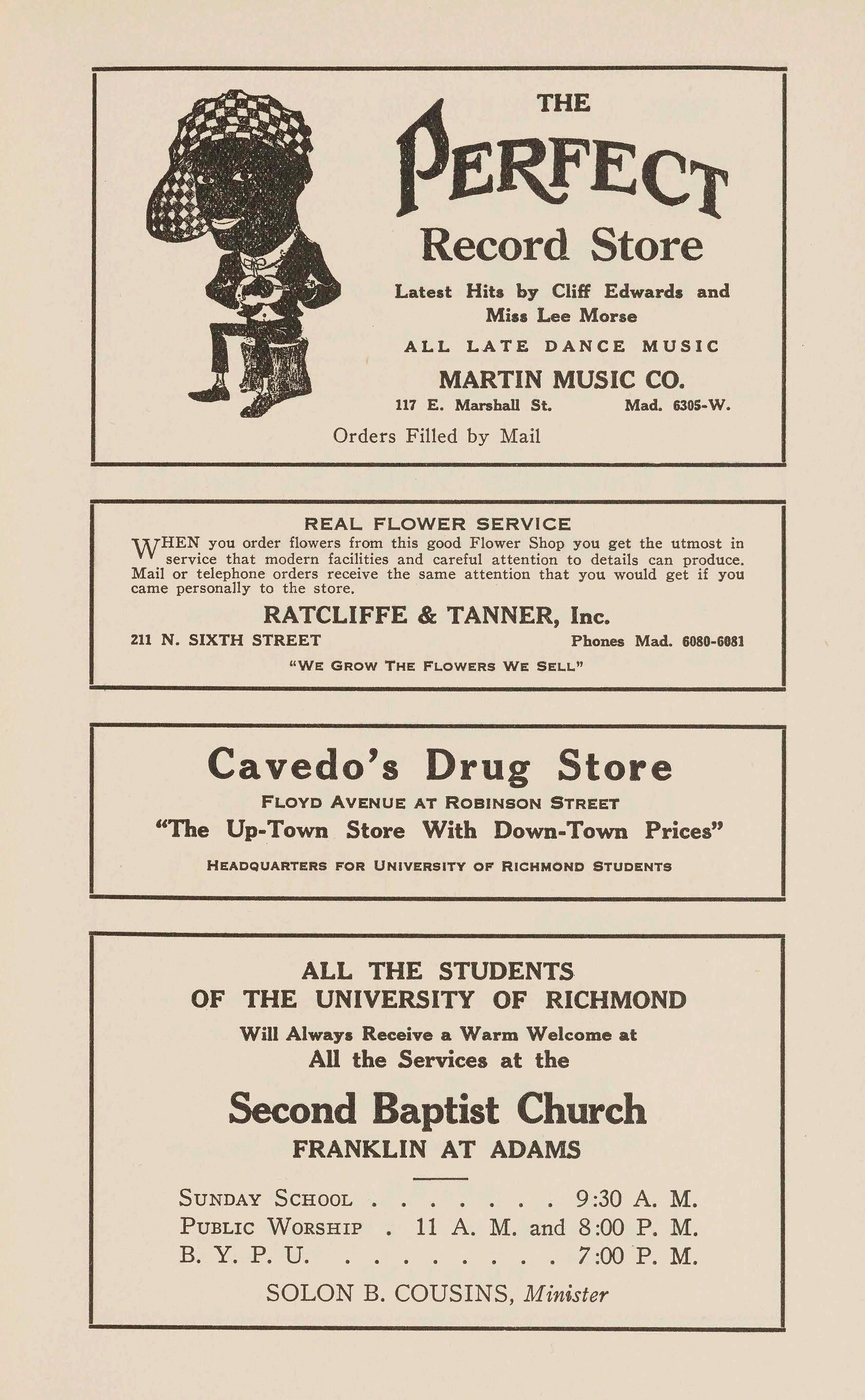
fMPROVE your game! Whatever the sport, SPALDING equipment will give you the greatest possible aid. Correctly designed and _ of the finest materials, you take no chances with a "Spalding."
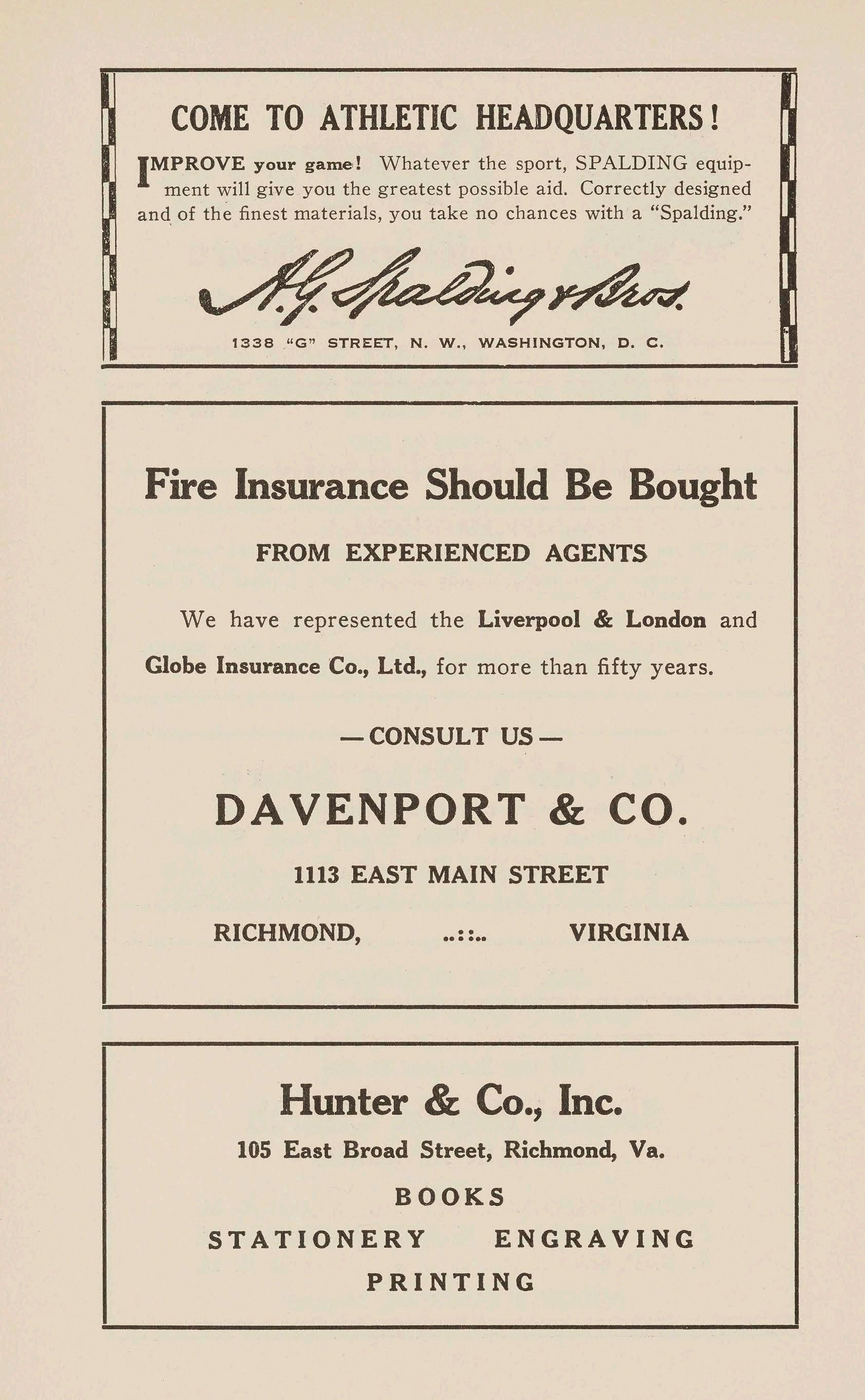
We have represented the Liverpool & London and Globe Insurance Co., Ltd., for more than fifty years.
Mfg. by THE BAUGHMAN STATIONERY CO.
Wholesale School Supplies
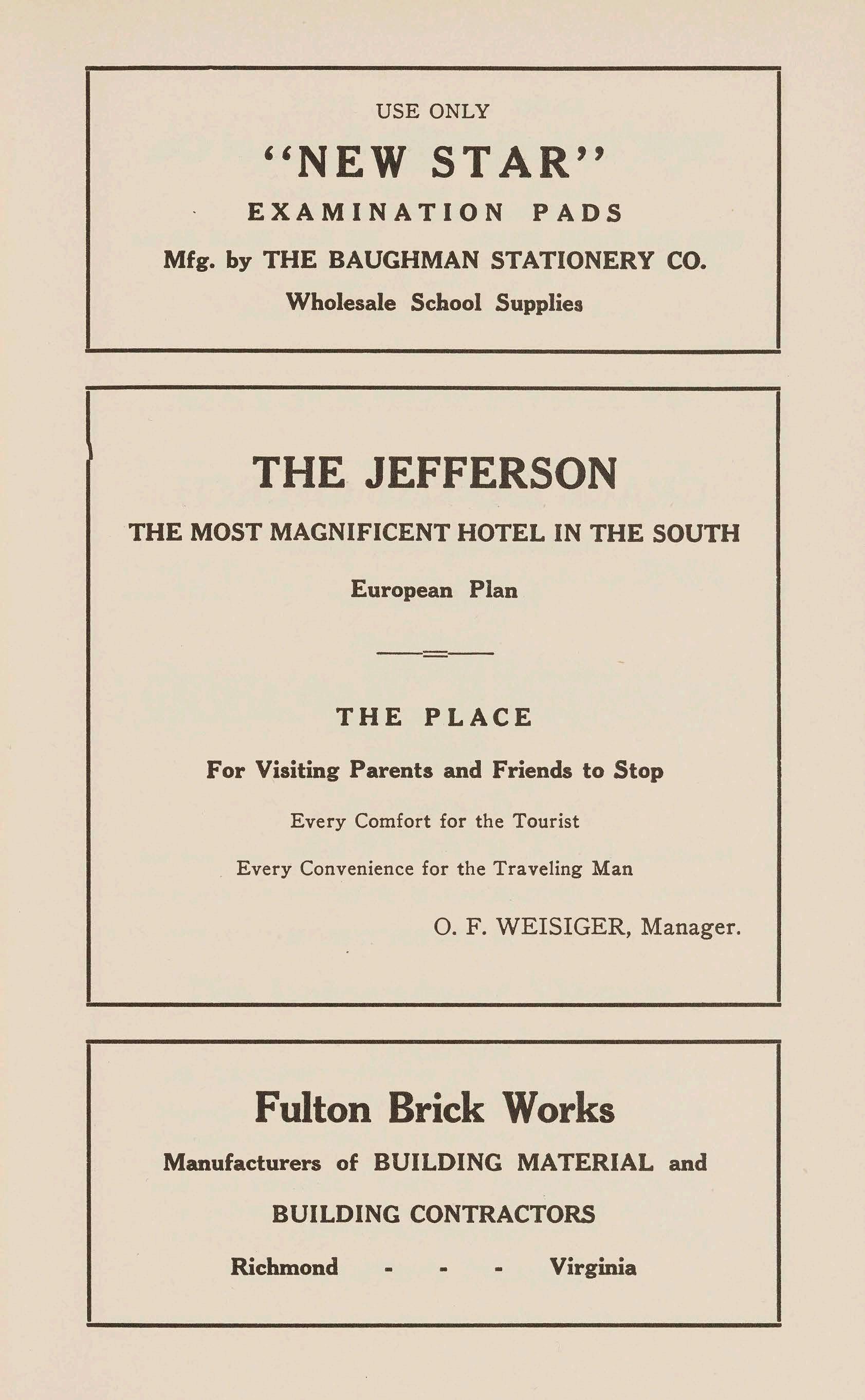
LEADING - LARGEST-OLDEST
OPTICAL HOUSE SOUTH
Main and Eighth Streets 223 East Broad Street
KODAK FILMS DEVELOPED FREE When Purchased of Us and Prints Are Ordered
MAIL ORDERS GIVEN PROMPT ATTENTION
Boulevard and Grove Avenue
RICHMOND, VA.
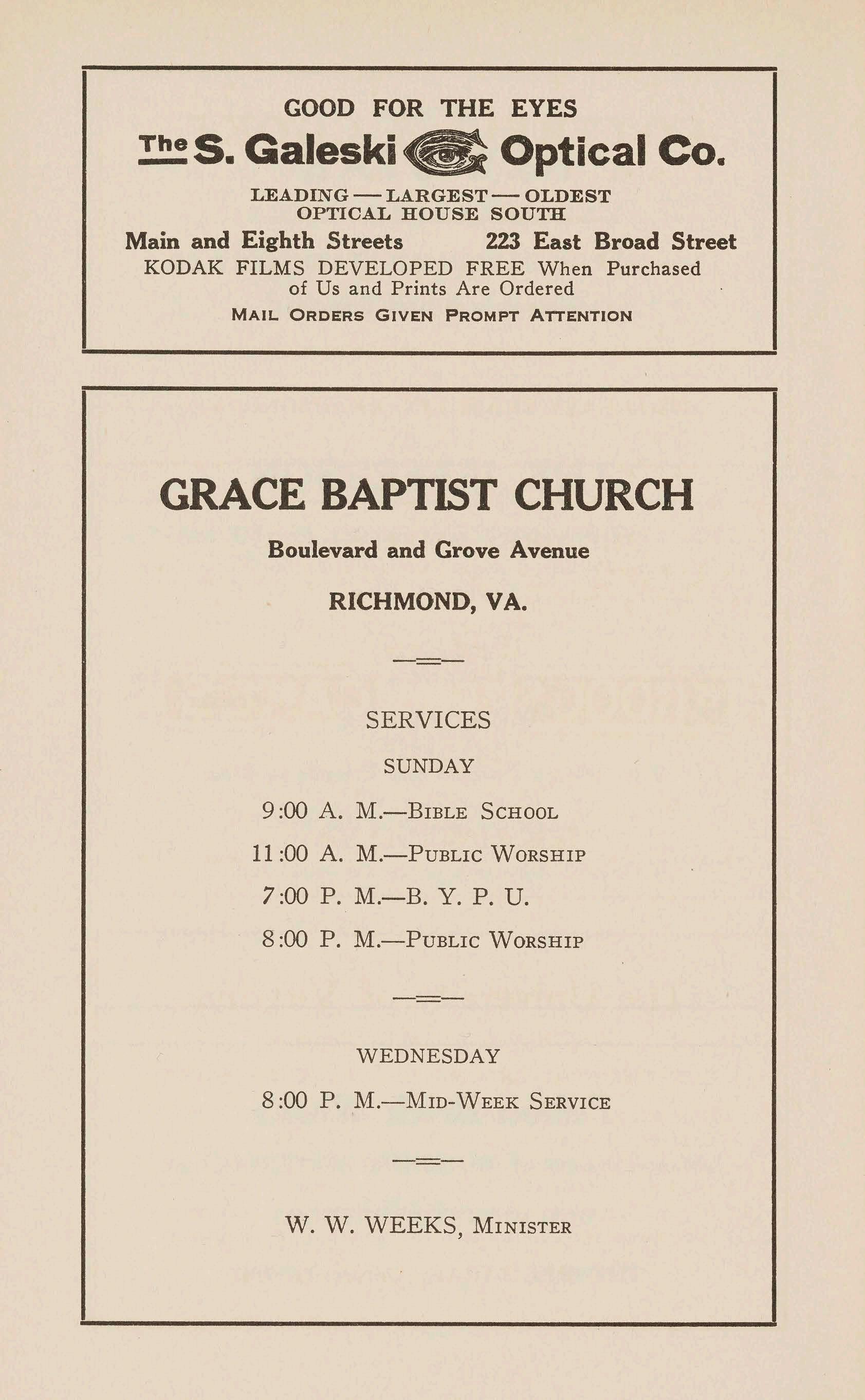
SUNDAY
9 :00 A. M.-BIBLE SCHOOL
11 :00 A. M.-PUBLIC WORSHIP
7 :00 P. M.-B. Y. P. U.
8 :00 P. M.-PUBLIC WORSHIP WEDNESDAY
8:00 P. M.-Mrn-WEEK SERVICE w. w. WEEKS, MINISTER
Are used in Kroog's (formerly Abrams') Cakes to give it that delicious homemade flavor and golden color. Demand the genuine of your dealer-if he doesn ' t handle Kroog ' s (formerly Abrams') Cakes, phone us
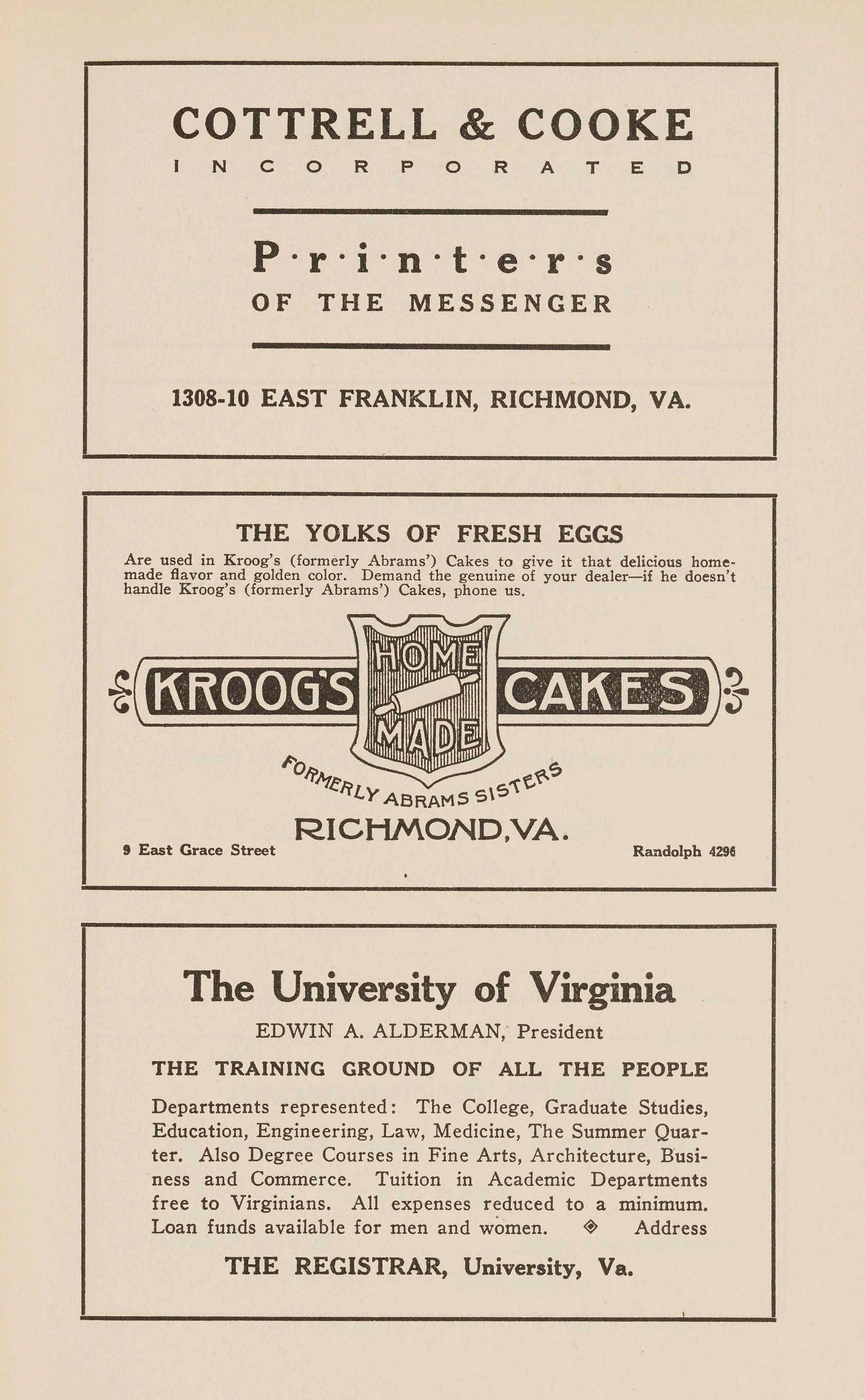
EDWIN A. ALDERMAN, President
THE TRAINING GROUND OF ALL THE PEOPLE
Departments represented: The College, Graduate Studies, Education, Engineering, Law, Medicine, The Summer Quarter. Also Degree Courses in Fine Arts, Architecture, Business and Commerce. Tuition in Academic Departments free to Virginians. All expenses reduced to a minimum. Loan funds available for men and women. Address
THE REGISTRAR, University, Va.

IMPORTED
Brass, Cloisonne, Chinese Vases, Silk Gauze Lanterns
Atlantic Hand Dipped Candles, Novelties
104 East Grace Street Madison 2570
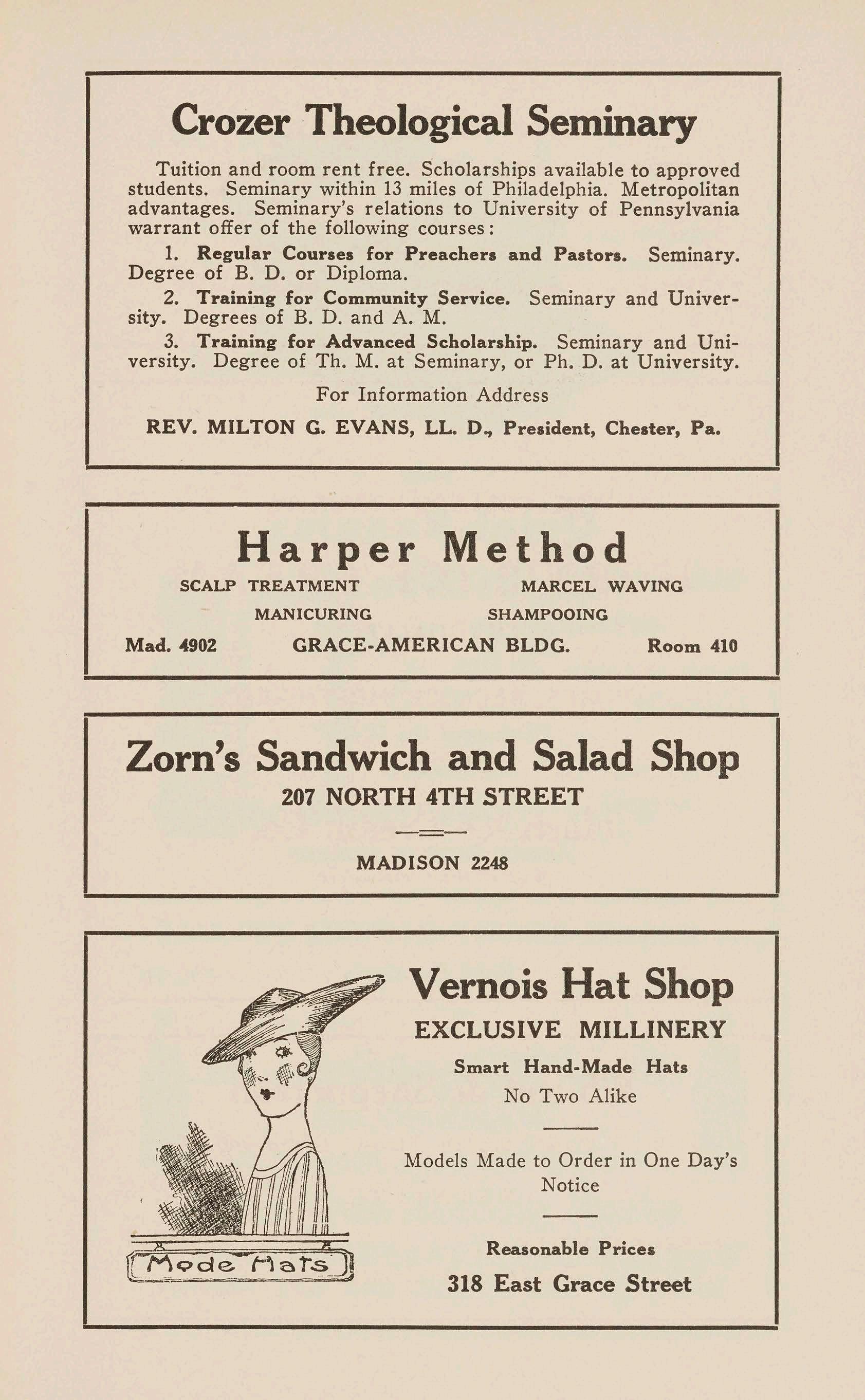
Tuition and room rent free. Scholarships available to approved students. Seminary within 13 miles of Philadelphia. Metropolitan advantages. Seminary's relations to University of Pennsylvania warrant offer of the following courses:
1. Regular Courses for Preachers and Pastors. Seminary. Degree of B. D. or Diploma.
2. Training for Community Service. Seminary and University. Degrees of B. D. and A. M.
3. Training for Advanced Scholarship. Seminary and University. Degree of Th. M. at Seminary, or Ph. D. at University.
REV. MIL TON G. EV ANS, LL. D., President, Chester, Pa.
DON'T JUST SAY
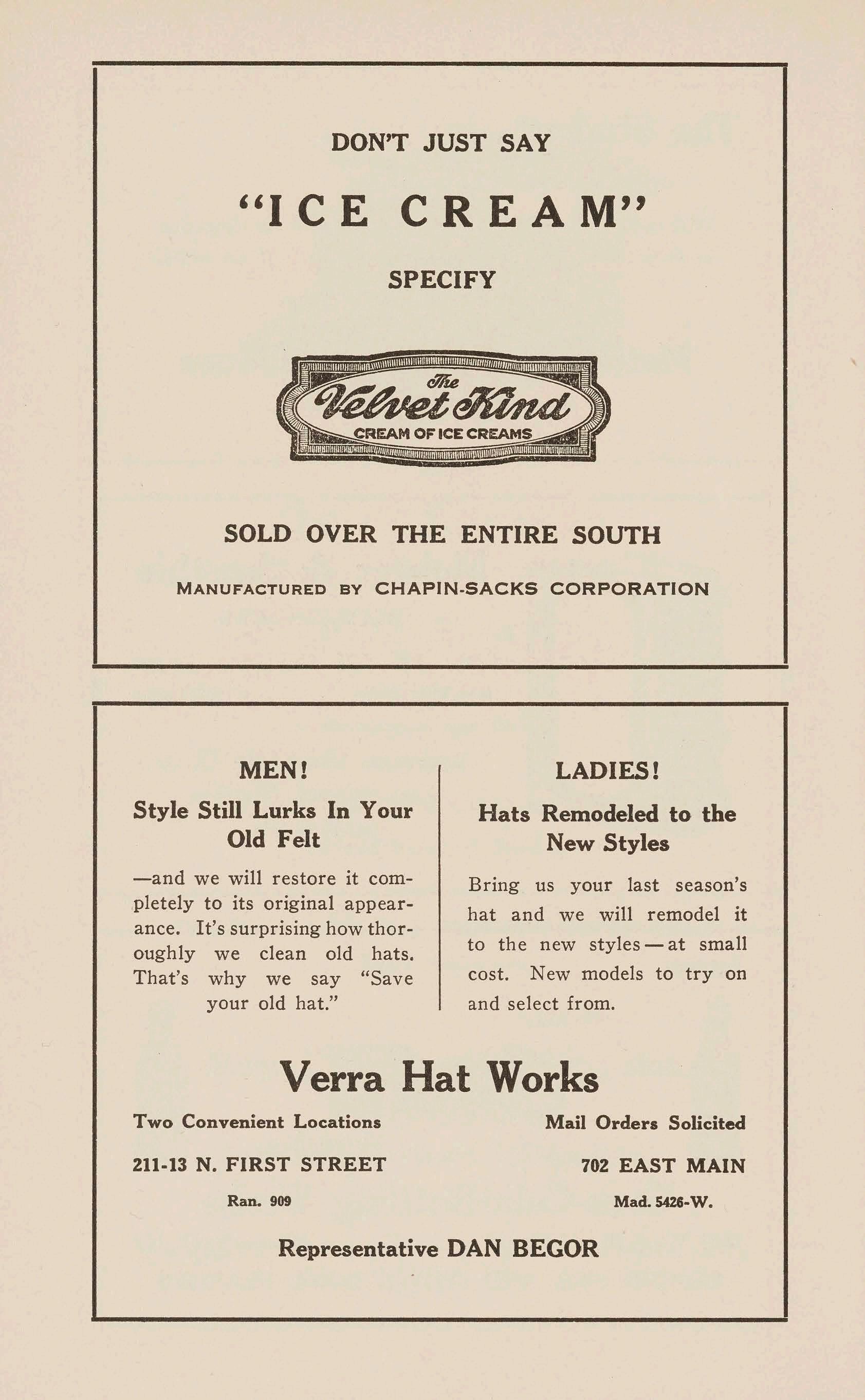
SOLD OVER THE ENTIRE SOUTH
MANUFACTURED BY CHAPIN-SACKS CORPORATION
-and we will restore it completely to its original appearance . It ' s surprising how thoroughly we clean old hats. That's why we say "Save your old hat."
Bring us your last season's hat and we will remodel it to the new styles - at small cost. New models to try on and select from.
Two Convenient Locations 211-13 N. FIRST STREET Ran. 909
Mail Orders Solicited 702 EAST MAIN Mad. 5426-W. Representative DAN BEGOR
Especially Invited to
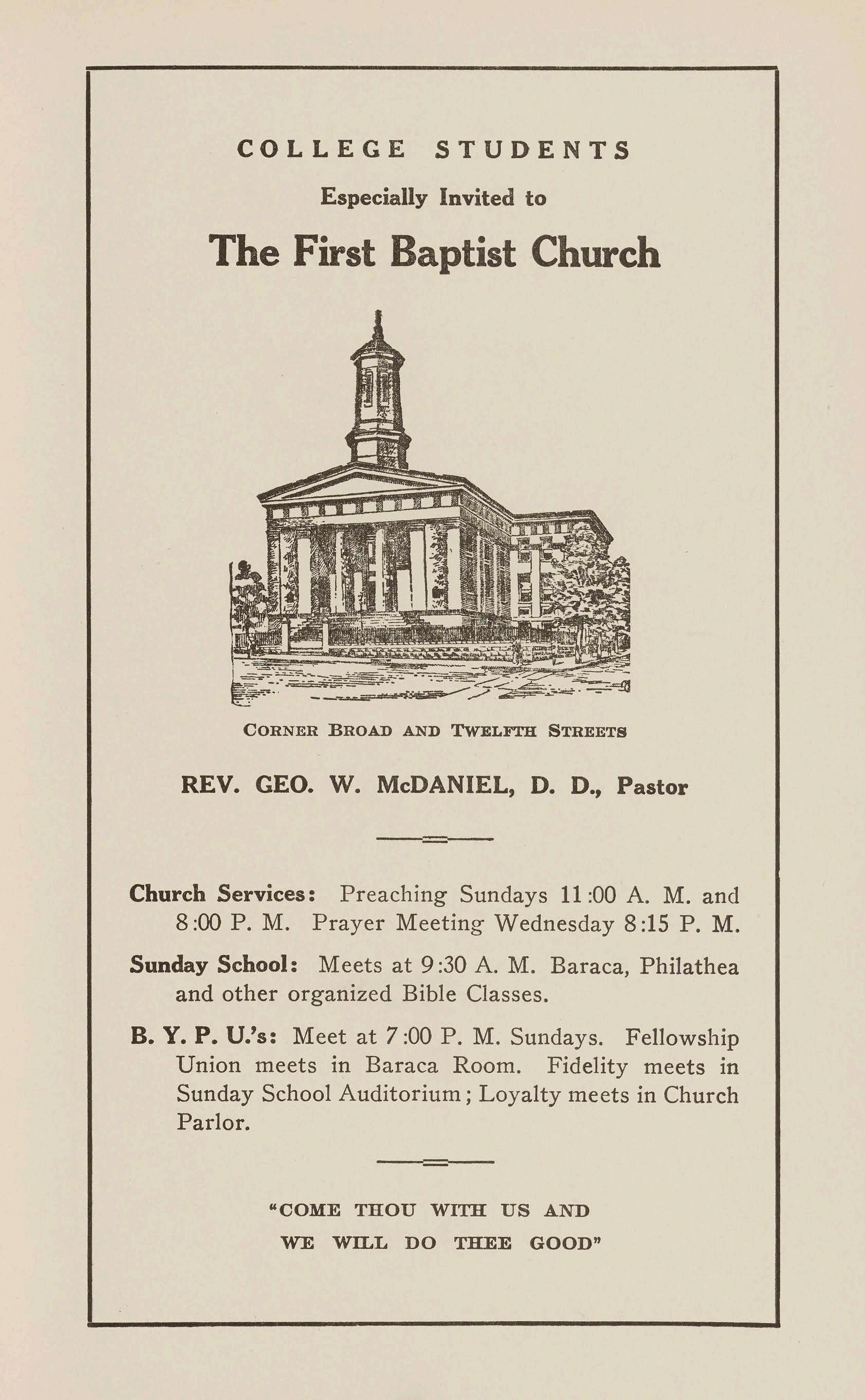
CORNER BROAD AND TwELFTH STREETS
REV. GEO. W. McDANIEL, D. D., Pastor
Church Services: Preaching Sundays 11 :00 A. M. and 8 :00 P. M. Prayer Meeting Wednesday 8 :15 P. M.
Sunday School: Meets at 9 :30 A. M. Baraca, Philathea and other organized Bible Classes.
B. Y. P. U.'s: Meet at 7 :00 P. M. Sundays. Fellowship Union meets in Baraca Room. Fidelity meets in Sunday School Auditorium; Loyalty meets in Church Parlor.
"COME THOU WITH US A.ND WE WILL DO THEE GOOD"

THE BOYS ' M EE TING PLA CE, AS WELL AS THE OLD GRADS RICHMOND HOME.
BROAD STREET AT EIGHTH